Shows
 Nella's Tin Trunk PodcastNella with John Barclay on Safari Legacy and Growing-Up in the Wilds of BotswanaJohn Barclay is a fountain of knowledge about the bush. His safari genealogy goes back generations. He is the grandson of the famous Jack Bousfield of Botswana, an explorer whose collection at Jack’s Camp is considered part of the national treasures of the country. His uncle, Ralph, is a mentor and avant-guarde thinker on all things safari and conservation. John has used his childhood in the bush to learn – and learn and learn. As you will hear, he is not only full of information but, above all, he is an acute observer, and his vantage point is the big...2025-06-1454 min
Nella's Tin Trunk PodcastNella with John Barclay on Safari Legacy and Growing-Up in the Wilds of BotswanaJohn Barclay is a fountain of knowledge about the bush. His safari genealogy goes back generations. He is the grandson of the famous Jack Bousfield of Botswana, an explorer whose collection at Jack’s Camp is considered part of the national treasures of the country. His uncle, Ralph, is a mentor and avant-guarde thinker on all things safari and conservation. John has used his childhood in the bush to learn – and learn and learn. As you will hear, he is not only full of information but, above all, he is an acute observer, and his vantage point is the big...2025-06-1454 min Mr. Hutchings HistoryRevolution or Chaos? The Weathermen's Radical CampaignIn today's episode of Mr. Hutchings History, we delve into the radicalism of the Weathermen, a splinter group of the New Left that turned to violence in pursuit of revolution. Born out of frustration with peaceful protest movements like those of Martin Luther King Jr., the Weathermen rejected nonviolent tactics and embraced bombings and destruction as symbolic attacks against U.S. imperialism and systemic oppression. This episode covers their key actions, such as the Days of Rage and bombings of government buildings, their ideological foundations, and the group's eventual fragmentation and failure. We also explore their lasting impact on...2024-12-1314 min
Mr. Hutchings HistoryRevolution or Chaos? The Weathermen's Radical CampaignIn today's episode of Mr. Hutchings History, we delve into the radicalism of the Weathermen, a splinter group of the New Left that turned to violence in pursuit of revolution. Born out of frustration with peaceful protest movements like those of Martin Luther King Jr., the Weathermen rejected nonviolent tactics and embraced bombings and destruction as symbolic attacks against U.S. imperialism and systemic oppression. This episode covers their key actions, such as the Days of Rage and bombings of government buildings, their ideological foundations, and the group's eventual fragmentation and failure. We also explore their lasting impact on...2024-12-1314 min Mr. Hutchings HistoryWhat Happened to the New Left? From Radicalism to FragmentationIn today’s episode of Mr. Hutchings History, we explore the rise and fall of the New Left in the 1960s, a radical student-led movement that sought to challenge the Vietnam War, racial inequality, and corporate power. The New Left, birthed from disillusionment with Cold War politics and civil rights activism, evolved into a potent force of social change. We examine key events like the Port Huron Statement and anti-war protests, but also the movement’s internal divisions, government repression, and violent extremism, particularly with groups like the Weathermen. As the New Left fractured, the removal of the draft and...2024-12-1323 min
Mr. Hutchings HistoryWhat Happened to the New Left? From Radicalism to FragmentationIn today’s episode of Mr. Hutchings History, we explore the rise and fall of the New Left in the 1960s, a radical student-led movement that sought to challenge the Vietnam War, racial inequality, and corporate power. The New Left, birthed from disillusionment with Cold War politics and civil rights activism, evolved into a potent force of social change. We examine key events like the Port Huron Statement and anti-war protests, but also the movement’s internal divisions, government repression, and violent extremism, particularly with groups like the Weathermen. As the New Left fractured, the removal of the draft and...2024-12-1323 min Mr. Hutchings HistoryThe Incomprehensible Counterculture: Woodstock, Altamont, and Middle America's DilemmaIn this episode of Mr. Hutchings History, we explore the height of the 1960s counterculture, focusing on two pivotal events: Woodstock and Altamont. Woodstock in 1969, often seen as a celebration of peace and music, symbolized the ideals of freedom, love, and communal living. However, just months later, the Altamont Free Festival in California exposed the darker side of the movement, descending into violence and chaos. These events revealed the stark contrast between the youthful counterculture and the traditional values of Middle America. We analyze how Woodstock’s message of unity collided with the violent reality of Altamont and examine th...2024-12-1311 min
Mr. Hutchings HistoryThe Incomprehensible Counterculture: Woodstock, Altamont, and Middle America's DilemmaIn this episode of Mr. Hutchings History, we explore the height of the 1960s counterculture, focusing on two pivotal events: Woodstock and Altamont. Woodstock in 1969, often seen as a celebration of peace and music, symbolized the ideals of freedom, love, and communal living. However, just months later, the Altamont Free Festival in California exposed the darker side of the movement, descending into violence and chaos. These events revealed the stark contrast between the youthful counterculture and the traditional values of Middle America. We analyze how Woodstock’s message of unity collided with the violent reality of Altamont and examine th...2024-12-1311 min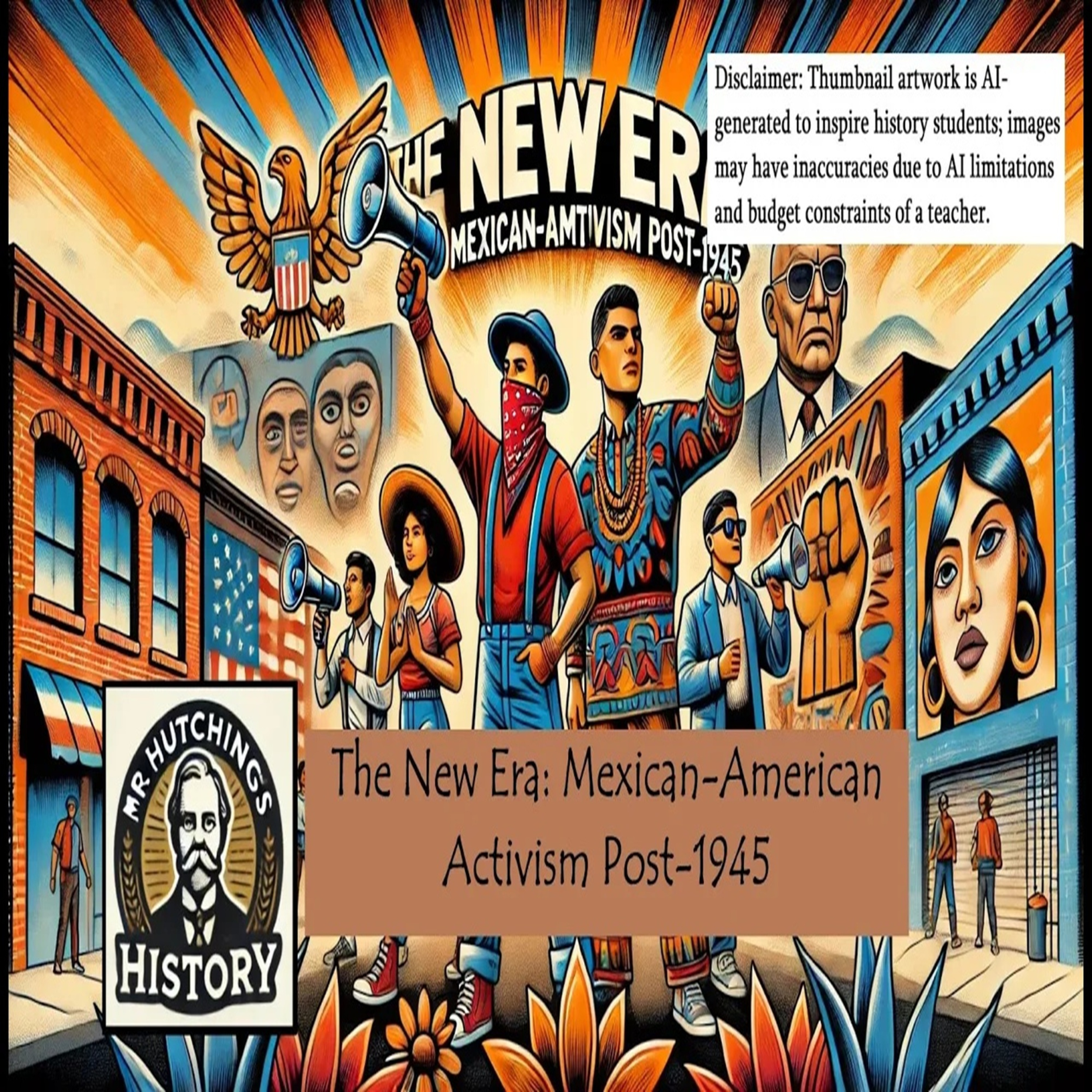 Mr. Hutchings HistoryThe New Era: Mexican-American Activism Post-1945In this episode of Mr. Hutchings History, we explore the rise of Mexican-American activism after 1945, focusing on key events, legal victories, and influential organizations that shaped the fight for civil rights. This period marks a pivotal moment in Mexican-American history, driven by military service, grassroots organizing, and a political awakening.
Key themes include:
World War II Impact: Mexican-American veterans and the racism they faced upon returning home, catalyzing activism.
The GI Forum: Dr. Hector P. Garcia’s founding of the American GI Forum and the Felix Longoria Affair, highlighting systemic discrimination.
LULAC’s Role: Legal battles and...2024-12-0713 min
Mr. Hutchings HistoryThe New Era: Mexican-American Activism Post-1945In this episode of Mr. Hutchings History, we explore the rise of Mexican-American activism after 1945, focusing on key events, legal victories, and influential organizations that shaped the fight for civil rights. This period marks a pivotal moment in Mexican-American history, driven by military service, grassroots organizing, and a political awakening.
Key themes include:
World War II Impact: Mexican-American veterans and the racism they faced upon returning home, catalyzing activism.
The GI Forum: Dr. Hector P. Garcia’s founding of the American GI Forum and the Felix Longoria Affair, highlighting systemic discrimination.
LULAC’s Role: Legal battles and...2024-12-0713 min Mr. Hutchings HistoryThe Rise and Challenges of Affirmative Action in the 1970sWelcome to Mr. Hutchings History! In today’s episode, we explore the emergence of affirmative action during the 1970s, a pivotal decade in U.S. civil rights history. This episode examines how the federal government, particularly through legal rulings like Griggs v. Duke Power Company (1971) and President Nixon’s policies, sought to combat racial inequality. However, despite the government’s efforts, resistance to these policies grew, culminating in the Bakke v. Regents case (1978) and the conservative backlash in the 1980s.
Key Topics:
The role of the federal government in advancing affirmative action, including Nixon’s actions.
The Bakk...2024-11-2217 min
Mr. Hutchings HistoryThe Rise and Challenges of Affirmative Action in the 1970sWelcome to Mr. Hutchings History! In today’s episode, we explore the emergence of affirmative action during the 1970s, a pivotal decade in U.S. civil rights history. This episode examines how the federal government, particularly through legal rulings like Griggs v. Duke Power Company (1971) and President Nixon’s policies, sought to combat racial inequality. However, despite the government’s efforts, resistance to these policies grew, culminating in the Bakke v. Regents case (1978) and the conservative backlash in the 1980s.
Key Topics:
The role of the federal government in advancing affirmative action, including Nixon’s actions.
The Bakk...2024-11-2217 min Mr. Hutchings HistoryCivil Rights Under Presidents Kennedy, 1961-63 and Johnson, 1963-69: Comparing the LegaciesWelcome to Mr. Hutchings History! In this episode, we delve into the civil rights legacies of Presidents John F. Kennedy (1961-63) and Lyndon B. Johnson (1963-69). While both played critical roles in the civil rights movement, their approaches and achievements differed significantly, shaped by political pressures, activism, and the challenges of their respective eras.
Key Topics:
Kennedy’s Reluctance: From the Freedom Rides to the March on Washington, Kennedy’s administration reacted to civil rights crises but hesitated to push bold reforms, constrained by Southern political support.
Johnson’s Legislative Drive: After Kennedy’s assassination, Johnson used his...2024-11-2219 min
Mr. Hutchings HistoryCivil Rights Under Presidents Kennedy, 1961-63 and Johnson, 1963-69: Comparing the LegaciesWelcome to Mr. Hutchings History! In this episode, we delve into the civil rights legacies of Presidents John F. Kennedy (1961-63) and Lyndon B. Johnson (1963-69). While both played critical roles in the civil rights movement, their approaches and achievements differed significantly, shaped by political pressures, activism, and the challenges of their respective eras.
Key Topics:
Kennedy’s Reluctance: From the Freedom Rides to the March on Washington, Kennedy’s administration reacted to civil rights crises but hesitated to push bold reforms, constrained by Southern political support.
Johnson’s Legislative Drive: After Kennedy’s assassination, Johnson used his...2024-11-2219 min Mr. Hutchings HistoryCivil Rights in the Truman Era, 1945-1953: Progress in Principle, Resistance in PracticeWelcome to Mr. Hutchings History! In this episode, we examine the Truman presidency and its civil rights legacy. From 1945 to 1953, President Harry S. Truman took groundbreaking steps, such as desegregating the military and creating the landmark To Secure These Rights report. However, his efforts faced significant resistance from Congress, particularly Southern Democrats, limiting the practical impact of his initiatives.
Key Topics:
Truman’s Civil Rights Agenda: The To Secure These Rights report called for an end to segregation and poll taxes, emphasizing the hypocrisy of racial discrimination during the Cold War.
Executive Orders: Desegregation of the ar...2024-11-2216 min
Mr. Hutchings HistoryCivil Rights in the Truman Era, 1945-1953: Progress in Principle, Resistance in PracticeWelcome to Mr. Hutchings History! In this episode, we examine the Truman presidency and its civil rights legacy. From 1945 to 1953, President Harry S. Truman took groundbreaking steps, such as desegregating the military and creating the landmark To Secure These Rights report. However, his efforts faced significant resistance from Congress, particularly Southern Democrats, limiting the practical impact of his initiatives.
Key Topics:
Truman’s Civil Rights Agenda: The To Secure These Rights report called for an end to segregation and poll taxes, emphasizing the hypocrisy of racial discrimination during the Cold War.
Executive Orders: Desegregation of the ar...2024-11-2216 min Mr. Hutchings HistoryTruman and Civil Rights, 1945-1953: A Step Forward or Political Calculus?Welcome to Mr. Hutchings History! This episode explores President Harry S. Truman’s approach to civil rights from 1945 to 1953, a pivotal era for federal intervention in racial equality. Truman’s presidency marked a turning point, with groundbreaking steps like desegregating the armed forces and creating the Fair Employment Practices Committee (FEPC). However, his actions faced resistance from Southern Democrats and were shaped by Cold War pressures.
Key Topics:
Executive Orders: Truman desegregated the military and federal employment in 1948, signaling federal support for civil rights.
Political Context: The Cold War influenced Truman’s policies as the U.S. sou...2024-11-2215 min
Mr. Hutchings HistoryTruman and Civil Rights, 1945-1953: A Step Forward or Political Calculus?Welcome to Mr. Hutchings History! This episode explores President Harry S. Truman’s approach to civil rights from 1945 to 1953, a pivotal era for federal intervention in racial equality. Truman’s presidency marked a turning point, with groundbreaking steps like desegregating the armed forces and creating the Fair Employment Practices Committee (FEPC). However, his actions faced resistance from Southern Democrats and were shaped by Cold War pressures.
Key Topics:
Executive Orders: Truman desegregated the military and federal employment in 1948, signaling federal support for civil rights.
Political Context: The Cold War influenced Truman’s policies as the U.S. sou...2024-11-2215 min Mr. Hutchings HistoryThe U.S. Government and Civil Rights: Power, Progress, and ResistanceWelcome to Mr. Hutchings History! In this episode, we analyze the role of the U.S. government in shaping civil rights progress for African Americans. We’ll explore how the Constitution’s system of checks and balances, along with conflicts between federal and state authorities, influenced pivotal legislative, judicial, and executive actions.
Key Highlights:
The Civil Rights Act of 1964 and Voting Rights Act of 1965 as legislative milestones amidst Congressional resistance.
Landmark Supreme Court cases like Brown v. Board of Education (1954) and Loving v. Virginia (1967) in dismantling systemic racism.
Presidential leadership, from Truman’s desegregation of the mi...2024-11-2215 min
Mr. Hutchings HistoryThe U.S. Government and Civil Rights: Power, Progress, and ResistanceWelcome to Mr. Hutchings History! In this episode, we analyze the role of the U.S. government in shaping civil rights progress for African Americans. We’ll explore how the Constitution’s system of checks and balances, along with conflicts between federal and state authorities, influenced pivotal legislative, judicial, and executive actions.
Key Highlights:
The Civil Rights Act of 1964 and Voting Rights Act of 1965 as legislative milestones amidst Congressional resistance.
Landmark Supreme Court cases like Brown v. Board of Education (1954) and Loving v. Virginia (1967) in dismantling systemic racism.
Presidential leadership, from Truman’s desegregation of the mi...2024-11-2215 min Mr. Hutchings HistoryMartin, Malcolm, and the Rise of Black Power: A Complex LegacyIn this episode of Mr. Hutchings History, we explore the interconnected contributions of Martin Luther King Jr., Malcolm X, and the Black Power movement to the fight for civil rights in America. While King’s nonviolent, integrationist approach brought legal victories, Malcolm’s calls for self-determination inspired Northern ghettos, and Black Power emphasized cultural pride and economic independence. We examine pivotal moments like the 1966 Meredith March and the rise of the Black Panther Party, assessing the shared and divergent goals of these transformative leaders and movements.
Key Discussion Points:
King’s shift to addressing systemic inequalities in Nor...2024-11-2221 min
Mr. Hutchings HistoryMartin, Malcolm, and the Rise of Black Power: A Complex LegacyIn this episode of Mr. Hutchings History, we explore the interconnected contributions of Martin Luther King Jr., Malcolm X, and the Black Power movement to the fight for civil rights in America. While King’s nonviolent, integrationist approach brought legal victories, Malcolm’s calls for self-determination inspired Northern ghettos, and Black Power emphasized cultural pride and economic independence. We examine pivotal moments like the 1966 Meredith March and the rise of the Black Panther Party, assessing the shared and divergent goals of these transformative leaders and movements.
Key Discussion Points:
King’s shift to addressing systemic inequalities in Nor...2024-11-2221 min Mr. Hutchings HistoryA Civil Rights Movement Followed by Black Power? Rethinking the TimelineIn this episode of Mr. Hutchings History, we challenge the traditional timeline that places the Civil Rights Movement (1955–1965) before the Black Power movement (1966–1970s). Recent scholarship argues these movements were not separate but overlapped and influenced one another. Explore how figures like Gloria Richardson and Robert Williams prefigured Black Power ideals during the Civil Rights era, and how leaders like Stokely Carmichael and the Black Panthers expanded the fight for racial justice into economic and cultural realms.
Key Discussion Points:
How grassroots activism blurred the lines between nonviolent civil rights strategies and the militant approach of Blac...2024-11-2219 min
Mr. Hutchings HistoryA Civil Rights Movement Followed by Black Power? Rethinking the TimelineIn this episode of Mr. Hutchings History, we challenge the traditional timeline that places the Civil Rights Movement (1955–1965) before the Black Power movement (1966–1970s). Recent scholarship argues these movements were not separate but overlapped and influenced one another. Explore how figures like Gloria Richardson and Robert Williams prefigured Black Power ideals during the Civil Rights era, and how leaders like Stokely Carmichael and the Black Panthers expanded the fight for racial justice into economic and cultural realms.
Key Discussion Points:
How grassroots activism blurred the lines between nonviolent civil rights strategies and the militant approach of Blac...2024-11-2219 min Mr. Hutchings HistoryUNIA and Marcus Garvey: Success or Failure?In this episode of Mr. Hutchings History, we examine the life of Marcus Garvey and the United Negro Improvement Association (UNIA), exploring its ambitious goals, groundbreaking achievements, and ultimate challenges. Did the movement succeed in empowering Black communities, or did it fall short of its lofty ideals? This discussion unpacks the complexities of Garvey's legacy and how it influenced future generations of activists.
Key Topics Covered:
Garvey’s Vision: Black pride, economic independence, and a “Back-to-Africa” movement.
UNIA’s Achievements: Mass mobilization, cultural empowerment, and the Black Star Line initiative.
Criticisms and Challenges: Financial mismanagement, government suppress...2024-11-2218 min
Mr. Hutchings HistoryUNIA and Marcus Garvey: Success or Failure?In this episode of Mr. Hutchings History, we examine the life of Marcus Garvey and the United Negro Improvement Association (UNIA), exploring its ambitious goals, groundbreaking achievements, and ultimate challenges. Did the movement succeed in empowering Black communities, or did it fall short of its lofty ideals? This discussion unpacks the complexities of Garvey's legacy and how it influenced future generations of activists.
Key Topics Covered:
Garvey’s Vision: Black pride, economic independence, and a “Back-to-Africa” movement.
UNIA’s Achievements: Mass mobilization, cultural empowerment, and the Black Star Line initiative.
Criticisms and Challenges: Financial mismanagement, government suppress...2024-11-2218 min Mr. Hutchings HistoryBlack Power: Radical Legacy or Civil Rights Adversary?In this episode of Mr. Hutchings History, we analyze the Black Power movement's origins, impact, and contested legacy. Was it a divisive departure from Civil Rights ideals, or an essential force for Black self-determination? This discussion uncovers its historical roots, cultural triumphs, and the challenges it faced, including ideological divisions and government repression.
Key Topics Covered:
Roots in Black Nationalism: From Marcus Garvey to the Black Panthers, Black Power’s connection to a long history of racial pride and self-reliance.
Achievements: Cultural empowerment, Afrocentric education, and grassroots community programs like the Panthers’ free breakfast initiatives.
Challenges: Divi...2024-11-2218 min
Mr. Hutchings HistoryBlack Power: Radical Legacy or Civil Rights Adversary?In this episode of Mr. Hutchings History, we analyze the Black Power movement's origins, impact, and contested legacy. Was it a divisive departure from Civil Rights ideals, or an essential force for Black self-determination? This discussion uncovers its historical roots, cultural triumphs, and the challenges it faced, including ideological divisions and government repression.
Key Topics Covered:
Roots in Black Nationalism: From Marcus Garvey to the Black Panthers, Black Power’s connection to a long history of racial pride and self-reliance.
Achievements: Cultural empowerment, Afrocentric education, and grassroots community programs like the Panthers’ free breakfast initiatives.
Challenges: Divi...2024-11-2218 min Mr. Hutchings HistoryMartin Luther King Jr. and the Call for Affirmative ActionWelcome to Mr. Hutchings History! In this episode, we explore Martin Luther King Jr.’s transformative advocacy for affirmative action, as articulated in his 1967 book Where Do We Go From Here? We’ll examine King’s vision of economic justice, his belief in the moral obligation to address historical racial inequities, and the challenges this bold approach faced.
Key Discussion Points:
King’s argument for affirmative action as a necessary step to correct systemic inequality and provide marginalized communities with genuine opportunities.
The historical context of affirmative action policies, beginning with JFK’s 1961 Executive Order 10925.
Historiographical perspectiv...2024-11-2216 min
Mr. Hutchings HistoryMartin Luther King Jr. and the Call for Affirmative ActionWelcome to Mr. Hutchings History! In this episode, we explore Martin Luther King Jr.’s transformative advocacy for affirmative action, as articulated in his 1967 book Where Do We Go From Here? We’ll examine King’s vision of economic justice, his belief in the moral obligation to address historical racial inequities, and the challenges this bold approach faced.
Key Discussion Points:
King’s argument for affirmative action as a necessary step to correct systemic inequality and provide marginalized communities with genuine opportunities.
The historical context of affirmative action policies, beginning with JFK’s 1961 Executive Order 10925.
Historiographical perspectiv...2024-11-2216 min Mr. Hutchings HistoryDe Facto Segregation in Chicago: The Struggle for Housing EqualityWelcome to Mr. Hutchings History! In this episode, we explore Dr. Martin Luther King Jr.’s 1966 Chicago campaign, where the Southern Christian Leadership Conference (SCLC) faced the challenges of de facto segregation, systemic poverty, and housing discrimination in a Northern urban setting. This campaign marked King’s bold shift from addressing Southern segregation to confronting entrenched economic injustices in the North.
Key Topics:
King’s focus on discriminatory housing practices and the challenges of mobilizing Chicago’s Black community.
Operation Breadbasket’s success in increasing Black employment under Jesse Jackson’s leadership.
The backlash from white residents du...2024-11-2213 min
Mr. Hutchings HistoryDe Facto Segregation in Chicago: The Struggle for Housing EqualityWelcome to Mr. Hutchings History! In this episode, we explore Dr. Martin Luther King Jr.’s 1966 Chicago campaign, where the Southern Christian Leadership Conference (SCLC) faced the challenges of de facto segregation, systemic poverty, and housing discrimination in a Northern urban setting. This campaign marked King’s bold shift from addressing Southern segregation to confronting entrenched economic injustices in the North.
Key Topics:
King’s focus on discriminatory housing practices and the challenges of mobilizing Chicago’s Black community.
Operation Breadbasket’s success in increasing Black employment under Jesse Jackson’s leadership.
The backlash from white residents du...2024-11-2213 min Mr. Hutchings HistoryKing’s 1966 Chicago Experience: Economic Justice and Urban ChallengesIn this episode of Mr. Hutchings History, we analyze Dr. Martin Luther King Jr.’s 1966 Chicago campaign, a pivotal chapter in the Civil Rights Movement that expanded the fight beyond Southern segregation to address systemic poverty and housing discrimination in Northern cities.
Key Topics Covered:
King’s relocation to Chicago’s West Side ghetto to highlight housing inequalities and urban poverty;
1550 S. Hamlin Avenue in the North Lawndale neighborhood (original building now demolished).
Challenges faced by the Southern Christian Leadership Conference (SCLC) in adapting Southern strategies to Northern issues like de facto segregation and economic injustice.
Histor...2024-11-2218 min
Mr. Hutchings HistoryKing’s 1966 Chicago Experience: Economic Justice and Urban ChallengesIn this episode of Mr. Hutchings History, we analyze Dr. Martin Luther King Jr.’s 1966 Chicago campaign, a pivotal chapter in the Civil Rights Movement that expanded the fight beyond Southern segregation to address systemic poverty and housing discrimination in Northern cities.
Key Topics Covered:
King’s relocation to Chicago’s West Side ghetto to highlight housing inequalities and urban poverty;
1550 S. Hamlin Avenue in the North Lawndale neighborhood (original building now demolished).
Challenges faced by the Southern Christian Leadership Conference (SCLC) in adapting Southern strategies to Northern issues like de facto segregation and economic injustice.
Histor...2024-11-2218 min Mr. Hutchings HistoryDr. King’s Northern Challenge: The 1966 Chicago CampaignIn this episode of Mr. Hutchings History, we explore Dr. Martin Luther King Jr.’s bold decision to bring the Civil Rights Movement to the urban North, focusing on his 1966 Chicago campaign. After groundbreaking successes in the South with the Civil Rights and Voting Rights Acts, King shifted his attention to the systemic economic injustices faced by Black Americans in cities like Chicago.
Key Discussion Points:
King’s focus on housing discrimination, economic inequality, and failing schools in Chicago’s Black neighborhoods.
The challenges of addressing de facto segregation and systemic racism, compared to the legal barrie...2024-11-2216 min
Mr. Hutchings HistoryDr. King’s Northern Challenge: The 1966 Chicago CampaignIn this episode of Mr. Hutchings History, we explore Dr. Martin Luther King Jr.’s bold decision to bring the Civil Rights Movement to the urban North, focusing on his 1966 Chicago campaign. After groundbreaking successes in the South with the Civil Rights and Voting Rights Acts, King shifted his attention to the systemic economic injustices faced by Black Americans in cities like Chicago.
Key Discussion Points:
King’s focus on housing discrimination, economic inequality, and failing schools in Chicago’s Black neighborhoods.
The challenges of addressing de facto segregation and systemic racism, compared to the legal barrie...2024-11-2216 min Mr. Hutchings HistoryThe 1955 Murder of Emmett Till: A Catalyst for the Civil Rights MovementIn this episode of Mr. Hutchings History, we explore the tragic and pivotal murder of 14-year-old Emmett Till in 1955, which became a catalyst for the Civil Rights Movement. Till's brutal killing in Mississippi and the subsequent trial of his murderers exposed the deep racial injustice in the South, igniting nationwide outrage. We'll examine the events leading to Till's death, the trial that followed, and the profound impact this case had on African American activism. The episode delves into the role of Till's mother, Mamie Till-Mobley, whose decision to hold an open-casket funeral brought the brutality of racism into the...2024-11-2213 min
Mr. Hutchings HistoryThe 1955 Murder of Emmett Till: A Catalyst for the Civil Rights MovementIn this episode of Mr. Hutchings History, we explore the tragic and pivotal murder of 14-year-old Emmett Till in 1955, which became a catalyst for the Civil Rights Movement. Till's brutal killing in Mississippi and the subsequent trial of his murderers exposed the deep racial injustice in the South, igniting nationwide outrage. We'll examine the events leading to Till's death, the trial that followed, and the profound impact this case had on African American activism. The episode delves into the role of Till's mother, Mamie Till-Mobley, whose decision to hold an open-casket funeral brought the brutality of racism into the...2024-11-2213 min Mr. Hutchings HistoryBreaking Down Jim Crow: The NAACP, State Reforms, and the Supreme Court, 1945-1955In this episode of Mr. Hutchings History, we explore how legal victories against Jim Crow laws between 1945 and 1955 paved the way for the Civil Rights Movement. The NAACP, led by Thurgood Marshall, adopted a strategic, case-by-case approach to dismantling segregation, gradually weakening the “separate but equal” doctrine. Landmark Supreme Court decisions, including Henderson v. United States, McLaurin v. Oklahoma State Regents, and Sweatt v. Painter, set critical precedents, proving that segregation was inherently unequal. At the same time, state and local reforms, such as fair employment laws and anti-discrimination measures, demonstrated that racial equality was achievable at multiple levels of g...2024-11-2215 min
Mr. Hutchings HistoryBreaking Down Jim Crow: The NAACP, State Reforms, and the Supreme Court, 1945-1955In this episode of Mr. Hutchings History, we explore how legal victories against Jim Crow laws between 1945 and 1955 paved the way for the Civil Rights Movement. The NAACP, led by Thurgood Marshall, adopted a strategic, case-by-case approach to dismantling segregation, gradually weakening the “separate but equal” doctrine. Landmark Supreme Court decisions, including Henderson v. United States, McLaurin v. Oklahoma State Regents, and Sweatt v. Painter, set critical precedents, proving that segregation was inherently unequal. At the same time, state and local reforms, such as fair employment laws and anti-discrimination measures, demonstrated that racial equality was achievable at multiple levels of g...2024-11-2215 min Mr. Hutchings HistoryA Sympathetic President: Harry Truman’s Role in Civil Rights, 1945-1955In this episode of Mr. Hutchings History, we explore President Harry S. Truman’s crucial role in advancing civil rights between 1945 and 1955. Truman’s leadership marked a shift in the federal government’s approach to racial equality, as his actions began to address the systemic injustices African Americans faced. In response to racial violence against Black veterans, Truman issued groundbreaking executive orders, including desegregating the military and establishing the Fair Employment Practices Committee. His 1947 report, To Secure These Rights, called for anti-lynching laws, desegregation of public spaces, and the extension of voting rights. Despite resistance from Southern Democrats, Truman’s suppor...2024-11-2213 min
Mr. Hutchings HistoryA Sympathetic President: Harry Truman’s Role in Civil Rights, 1945-1955In this episode of Mr. Hutchings History, we explore President Harry S. Truman’s crucial role in advancing civil rights between 1945 and 1955. Truman’s leadership marked a shift in the federal government’s approach to racial equality, as his actions began to address the systemic injustices African Americans faced. In response to racial violence against Black veterans, Truman issued groundbreaking executive orders, including desegregating the military and establishing the Fair Employment Practices Committee. His 1947 report, To Secure These Rights, called for anti-lynching laws, desegregation of public spaces, and the extension of voting rights. Despite resistance from Southern Democrats, Truman’s suppor...2024-11-2213 min Mr. Hutchings HistoryShort-Term Causes of the Civil Rights Movement: 1945-1955In this episode of Mr. Hutchings History, we explore the short-term causes of the Civil Rights Movement, focusing on the pivotal years from 1945 to 1955. Although racial inequality had been entrenched for centuries, these years saw crucial developments that would lay the groundwork for the activism of the 1950s and 60s. The return of Black soldiers from WWII, spurred by the "Double V" campaign, intensified the demand for equality both abroad and at home. President Truman’s support for civil rights, including his executive order to desegregate the military, signaled a shift in federal priorities. Legal victories, such as the Su...2024-11-2221 min
Mr. Hutchings HistoryShort-Term Causes of the Civil Rights Movement: 1945-1955In this episode of Mr. Hutchings History, we explore the short-term causes of the Civil Rights Movement, focusing on the pivotal years from 1945 to 1955. Although racial inequality had been entrenched for centuries, these years saw crucial developments that would lay the groundwork for the activism of the 1950s and 60s. The return of Black soldiers from WWII, spurred by the "Double V" campaign, intensified the demand for equality both abroad and at home. President Truman’s support for civil rights, including his executive order to desegregate the military, signaled a shift in federal priorities. Legal victories, such as the Su...2024-11-2221 min Mr. Hutchings HistoryAfrican Americans and U.S. Involvement in the World Wars: A Catalyst for ChangeIn this episode of Mr. Hutchings History, we explore how the two World Wars acted as powerful catalysts for African American civil rights activism. Fighting for freedom abroad highlighted the stark contrast between the rhetoric of democracy and the reality of racial inequality at home. This episode examines the impact of Black soldiers' experiences in both World Wars, the rise of the "Double V" campaign, and key figures like A. Philip Randolph and James Farmer. We’ll also look at the role of organizations such as the NAACP and CORE in challenging racial oppression, and the shift in African Am...2024-11-2226 min
Mr. Hutchings HistoryAfrican Americans and U.S. Involvement in the World Wars: A Catalyst for ChangeIn this episode of Mr. Hutchings History, we explore how the two World Wars acted as powerful catalysts for African American civil rights activism. Fighting for freedom abroad highlighted the stark contrast between the rhetoric of democracy and the reality of racial inequality at home. This episode examines the impact of Black soldiers' experiences in both World Wars, the rise of the "Double V" campaign, and key figures like A. Philip Randolph and James Farmer. We’ll also look at the role of organizations such as the NAACP and CORE in challenging racial oppression, and the shift in African Am...2024-11-2226 min Mr. Hutchings HistoryThe NAACP’s Legal Strategy: Breaking Down Jim Crow One Case at a TimeIn this episode of Mr. Hutchings History, we explore the National Association for the Advancement of Colored People (NAACP) and its instrumental role in challenging and dismantling Jim Crow laws through strategic legal action. Founded in 1909, the NAACP sought to use the U.S. legal system to combat racial segregation and disenfranchisement. We’ll examine landmark cases like Guinn v. United States, Missouri ex rel. Gaines v. Canada, and Smith v. Allwright, where Thurgood Marshall and other NAACP lawyers made crucial strides in securing equal rights for African Americans. While the organization’s incremental victories laid the groundwork for futu...2024-11-2213 min
Mr. Hutchings HistoryThe NAACP’s Legal Strategy: Breaking Down Jim Crow One Case at a TimeIn this episode of Mr. Hutchings History, we explore the National Association for the Advancement of Colored People (NAACP) and its instrumental role in challenging and dismantling Jim Crow laws through strategic legal action. Founded in 1909, the NAACP sought to use the U.S. legal system to combat racial segregation and disenfranchisement. We’ll examine landmark cases like Guinn v. United States, Missouri ex rel. Gaines v. Canada, and Smith v. Allwright, where Thurgood Marshall and other NAACP lawyers made crucial strides in securing equal rights for African Americans. While the organization’s incremental victories laid the groundwork for futu...2024-11-2213 min Mr. Hutchings HistoryFoundations of the Civil Rights Movement: African Americans, 1900-1945In this episode of Mr. Hutchings History, we trace the roots of the Civil Rights Movement from 1900 to 1945, a period of growing Black consciousness and activism. From Booker T. Washington’s accommodationism to W.E.B. Du Bois’s call for political equality, key figures and organizations like the NAACP, Marcus Garvey’s UNIA, and A. Philip Randolph’s labor activism shaped the path toward racial equality. We explore how early legal challenges, the Harlem Renaissance, and the rise of Black nationalism laid the groundwork for the monumental Civil Rights Movement of the 1950s and 60s.
Join us as we...2024-11-2217 min
Mr. Hutchings HistoryFoundations of the Civil Rights Movement: African Americans, 1900-1945In this episode of Mr. Hutchings History, we trace the roots of the Civil Rights Movement from 1900 to 1945, a period of growing Black consciousness and activism. From Booker T. Washington’s accommodationism to W.E.B. Du Bois’s call for political equality, key figures and organizations like the NAACP, Marcus Garvey’s UNIA, and A. Philip Randolph’s labor activism shaped the path toward racial equality. We explore how early legal challenges, the Harlem Renaissance, and the rise of Black nationalism laid the groundwork for the monumental Civil Rights Movement of the 1950s and 60s.
Join us as we...2024-11-2217 min Mr. Hutchings HistoryJim Crow and Segregation: The Legalization of Racial InequalityIn this episode of Mr. Hutchings History, we examine the roots and impact of racial segregation in the United States, particularly the implementation of Jim Crow laws that legalized discrimination. Following the end of Reconstruction, Southern states enacted these laws to enforce racial segregation, most notably through the 1896 Plessy v. Ferguson decision that established the "separate but equal" doctrine. While de jure segregation dominated the South, de facto segregation in the North also entrenched racial inequality through practices like redlining and unequal school funding.
We delve into the legal challenges against segregation led by organizations like the...2024-11-2210 min
Mr. Hutchings HistoryJim Crow and Segregation: The Legalization of Racial InequalityIn this episode of Mr. Hutchings History, we examine the roots and impact of racial segregation in the United States, particularly the implementation of Jim Crow laws that legalized discrimination. Following the end of Reconstruction, Southern states enacted these laws to enforce racial segregation, most notably through the 1896 Plessy v. Ferguson decision that established the "separate but equal" doctrine. While de jure segregation dominated the South, de facto segregation in the North also entrenched racial inequality through practices like redlining and unequal school funding.
We delve into the legal challenges against segregation led by organizations like the...2024-11-2210 min Mr. Hutchings HistoryFrom Marginalization to Advocacy: Native American and First Nations Civil Rights, 1900–1945In this episode of Mr. Hutchings History, we explore the difficult period between 1900 and 1945, when Native Americans in the USA and First Nations peoples in Canada faced significant marginalization but also began to advocate for their rights. We discuss pivotal moments like the 1924 Indian Citizenship Act, the Indian Reorganization Act of 1934, and Canada’s League of Indians founded by Frederick Loft. These developments were both a response to cultural suppression and an early form of resistance, as Indigenous communities began organizing and pushing for recognition and rights. We examine the impact of discriminatory policies, such as the Meriam Report, fo...2024-11-2233 min
Mr. Hutchings HistoryFrom Marginalization to Advocacy: Native American and First Nations Civil Rights, 1900–1945In this episode of Mr. Hutchings History, we explore the difficult period between 1900 and 1945, when Native Americans in the USA and First Nations peoples in Canada faced significant marginalization but also began to advocate for their rights. We discuss pivotal moments like the 1924 Indian Citizenship Act, the Indian Reorganization Act of 1934, and Canada’s League of Indians founded by Frederick Loft. These developments were both a response to cultural suppression and an early form of resistance, as Indigenous communities began organizing and pushing for recognition and rights. We examine the impact of discriminatory policies, such as the Meriam Report, fo...2024-11-2233 min Mr. Hutchings HistoryCanada’s Cold War Era – Domestic Policy and the Nation’s TransformationIn this episode of Mr. Hutchings History, we explore how Canada’s domestic policies were deeply shaped by the Cold War from 1946 to 1991. We look at the political shifts, economic policies, and cultural transformations that defined this era. From Prime Minister John Diefenbaker’s push for Canadian sovereignty to Pierre Trudeau’s social welfare policies and the rise of Quebec separatism, the Cold War influenced everything. We also discuss Canada’s response to global tensions and its evolving identity, balancing its role in NATO with a desire for a more independent foreign policy. Finally, we examine the impact of Cold War...2024-11-2121 min
Mr. Hutchings HistoryCanada’s Cold War Era – Domestic Policy and the Nation’s TransformationIn this episode of Mr. Hutchings History, we explore how Canada’s domestic policies were deeply shaped by the Cold War from 1946 to 1991. We look at the political shifts, economic policies, and cultural transformations that defined this era. From Prime Minister John Diefenbaker’s push for Canadian sovereignty to Pierre Trudeau’s social welfare policies and the rise of Quebec separatism, the Cold War influenced everything. We also discuss Canada’s response to global tensions and its evolving identity, balancing its role in NATO with a desire for a more independent foreign policy. Finally, we examine the impact of Cold War...2024-11-2121 min Mr. Hutchings HistoryDiefenbaker, Civil Rights, and the Global Fight Against ApartheidWelcome to Mr. Hutchings History! Today, we examine Prime Minister John Diefenbaker’s pivotal role in advancing civil rights in Canada and his firm stance against apartheid. Diefenbaker's government marked significant milestones in the Canadian fight for equality, including the 1960 Canadian Bill of Rights and the extension of voting rights to Indigenous peoples. On the global stage, his outspoken opposition to apartheid in South Africa helped shape Canada’s moral authority in international diplomacy. Through his actions, Diefenbaker positioned Canada as a defender of human rights, challenging apartheid policies within the Commonwealth. This episode dives into the domestic and inte...2024-11-2114 min
Mr. Hutchings HistoryDiefenbaker, Civil Rights, and the Global Fight Against ApartheidWelcome to Mr. Hutchings History! Today, we examine Prime Minister John Diefenbaker’s pivotal role in advancing civil rights in Canada and his firm stance against apartheid. Diefenbaker's government marked significant milestones in the Canadian fight for equality, including the 1960 Canadian Bill of Rights and the extension of voting rights to Indigenous peoples. On the global stage, his outspoken opposition to apartheid in South Africa helped shape Canada’s moral authority in international diplomacy. Through his actions, Diefenbaker positioned Canada as a defender of human rights, challenging apartheid policies within the Commonwealth. This episode dives into the domestic and inte...2024-11-2114 min Mr. Hutchings HistoryCold War Surveillance and Canada's Left—The PROFUNC EraWelcome back to Mr. Hutchings History! In this episode, we explore Canada's response to the Cold War's political paranoia, focusing on the secretive PROFUNC program. Launched in the 1950s, PROFUNC aimed to monitor and suppress left-wing groups, particularly those with suspected communist ties. While not as extreme as U.S. McCarthyism, Canada's approach still led to significant government surveillance and the marginalization of socialist movements. We delve into the tragic death of Canadian diplomat E. Herbert Norman, a key event that sparked national outrage and highlighted the dangers of Cold War paranoia. #Paper3HLoption2 #ColdWarCanada #RedScareCanada #PROFUNC...2024-11-2118 min
Mr. Hutchings HistoryCold War Surveillance and Canada's Left—The PROFUNC EraWelcome back to Mr. Hutchings History! In this episode, we explore Canada's response to the Cold War's political paranoia, focusing on the secretive PROFUNC program. Launched in the 1950s, PROFUNC aimed to monitor and suppress left-wing groups, particularly those with suspected communist ties. While not as extreme as U.S. McCarthyism, Canada's approach still led to significant government surveillance and the marginalization of socialist movements. We delve into the tragic death of Canadian diplomat E. Herbert Norman, a key event that sparked national outrage and highlighted the dangers of Cold War paranoia. #Paper3HLoption2 #ColdWarCanada #RedScareCanada #PROFUNC...2024-11-2118 min Mr. Hutchings HistoryThe Cold War and Canada's Domestic Policies—The Red Scare RevisitedIn today’s episode of Mr. Hutchings History, we'll explore Canada’s response to communism, labor movements, and civil liberties amid the global tensions of the Cold War. From the 1919 Winnipeg General Strike to the critical Gouzenko Affair of 1945, we analyze how Canada navigated its own Red Scare, balancing national security concerns with civil rights. #Paper3HLoption2 #ColdWarCanada #RedScare #GouzenkoAffair #CanadaLaborMovements #McCarthyism #ColdWarDomesticPolicy #CanadianHistory #CivilLiberties #AntiCommunistPolicies #CanadaCommunism #WinnipegGeneralStrike #CanadianForeignPolicy #ColdWarLegacy #CSIS #RealistHistorians #LiberalInternationalism #MarxistHistorians #RevisionistHistoriansWorks CitedGranatstein, J.L., and David J. Bercuson. War and Peacekeeping: From South Africa to the Gulf—Canada...2024-11-2116 min
Mr. Hutchings HistoryThe Cold War and Canada's Domestic Policies—The Red Scare RevisitedIn today’s episode of Mr. Hutchings History, we'll explore Canada’s response to communism, labor movements, and civil liberties amid the global tensions of the Cold War. From the 1919 Winnipeg General Strike to the critical Gouzenko Affair of 1945, we analyze how Canada navigated its own Red Scare, balancing national security concerns with civil rights. #Paper3HLoption2 #ColdWarCanada #RedScare #GouzenkoAffair #CanadaLaborMovements #McCarthyism #ColdWarDomesticPolicy #CanadianHistory #CivilLiberties #AntiCommunistPolicies #CanadaCommunism #WinnipegGeneralStrike #CanadianForeignPolicy #ColdWarLegacy #CSIS #RealistHistorians #LiberalInternationalism #MarxistHistorians #RevisionistHistoriansWorks CitedGranatstein, J.L., and David J. Bercuson. War and Peacekeeping: From South Africa to the Gulf—Canada...2024-11-2116 min Mr. Hutchings HistoryCanada and the Cold War—Cruise Missiles and DiplomacyIn this episode of Mr. Hutchings History, we explore Canada's controversial role in Cold War geopolitics through the cruise missile testing of the 1980s. Prime Ministers Pierre Trudeau and Brian Mulroney navigated the complex dynamics of NATO commitments and diplomatic efforts to engage with the Soviet Union. We examine Trudeau's decision to permit missile tests in 1982, despite his earlier peacekeeping stance, and Mulroney’s policies amidst widespread domestic protests. This episode also highlights Canada's growing defense capabilities, such as Project Spinnaker, and its diplomatic efforts to reduce Cold War tensions, especially in relations with the Soviet Union. We’ll disc...2024-11-2112 min
Mr. Hutchings HistoryCanada and the Cold War—Cruise Missiles and DiplomacyIn this episode of Mr. Hutchings History, we explore Canada's controversial role in Cold War geopolitics through the cruise missile testing of the 1980s. Prime Ministers Pierre Trudeau and Brian Mulroney navigated the complex dynamics of NATO commitments and diplomatic efforts to engage with the Soviet Union. We examine Trudeau's decision to permit missile tests in 1982, despite his earlier peacekeeping stance, and Mulroney’s policies amidst widespread domestic protests. This episode also highlights Canada's growing defense capabilities, such as Project Spinnaker, and its diplomatic efforts to reduce Cold War tensions, especially in relations with the Soviet Union. We’ll disc...2024-11-2112 min Mr. Hutchings HistoryTrudeau’s Foreign Policy and the Cold War ShiftWelcome to Mr. Hutchings History! In this episode, we explore Prime Minister Pierre Elliott Trudeau's transformative foreign policy during the Cold War. From 1968, Trudeau sought to redefine Canada’s role on the world stage, moving away from traditional military alliances like NATO towards a more independent stance. We examine his controversial diplomatic efforts, including his recognition of China and visits to Cuba, which challenged U.S. policies and Cold War orthodoxy. Trudeau's public criticism of U.S. military strategies in Vietnam and his efforts to de-escalate Cold War tensions reflect his commitment to diplomacy, sovereignty, and multilateralism. This episode di...2024-11-2111 min
Mr. Hutchings HistoryTrudeau’s Foreign Policy and the Cold War ShiftWelcome to Mr. Hutchings History! In this episode, we explore Prime Minister Pierre Elliott Trudeau's transformative foreign policy during the Cold War. From 1968, Trudeau sought to redefine Canada’s role on the world stage, moving away from traditional military alliances like NATO towards a more independent stance. We examine his controversial diplomatic efforts, including his recognition of China and visits to Cuba, which challenged U.S. policies and Cold War orthodoxy. Trudeau's public criticism of U.S. military strategies in Vietnam and his efforts to de-escalate Cold War tensions reflect his commitment to diplomacy, sovereignty, and multilateralism. This episode di...2024-11-2111 min Mr. Hutchings HistoryCanada’s Role in the Cuban Missile Crisis – Independence or Isolation?Welcome to Mr. Hutchings History! In this episode, we explore Canada’s role in the Cuban Missile Crisis of 1962—a pivotal moment in Cold War history. Prime Minister John Diefenbaker’s decision to resist U.S. pressure and not immediately align with the United States’ military stance sparked a fierce debate on Canada’s foreign policy direction. Diefenbaker’s insistence on diplomacy and seeking UN intervention marked a departure from traditional Cold War dynamics and raised significant questions about Canadian sovereignty and independence. Join us as we examine the impact of Diefenbaker’s decision on Canada-U.S. relations and its long-term...2024-11-2121 min
Mr. Hutchings HistoryCanada’s Role in the Cuban Missile Crisis – Independence or Isolation?Welcome to Mr. Hutchings History! In this episode, we explore Canada’s role in the Cuban Missile Crisis of 1962—a pivotal moment in Cold War history. Prime Minister John Diefenbaker’s decision to resist U.S. pressure and not immediately align with the United States’ military stance sparked a fierce debate on Canada’s foreign policy direction. Diefenbaker’s insistence on diplomacy and seeking UN intervention marked a departure from traditional Cold War dynamics and raised significant questions about Canadian sovereignty and independence. Join us as we examine the impact of Diefenbaker’s decision on Canada-U.S. relations and its long-term...2024-11-2121 min Mr. Hutchings HistoryThe BOMARC Crisis – Nuclear Debate in Cold War CanadaWelcome to Mr. Hutchings History! Today’s episode delves into the BOMARC Crisis, a defining moment in Cold War Canada that sparked fierce debate over nuclear weapons, sovereignty, and national security. We explore the tension surrounding the deployment of U.S.-made BOMARC missiles in Canada as part of the North American Defense Agreement (NORAD). This episode examines the heated debate between anti-nuclear protestors, who saw the missiles as a threat to Canadian sovereignty and moral standing, and supporters who viewed the missiles as vital for defending North America from Soviet threats. We’ll also explore the impact of this...2024-11-2120 min
Mr. Hutchings HistoryThe BOMARC Crisis – Nuclear Debate in Cold War CanadaWelcome to Mr. Hutchings History! Today’s episode delves into the BOMARC Crisis, a defining moment in Cold War Canada that sparked fierce debate over nuclear weapons, sovereignty, and national security. We explore the tension surrounding the deployment of U.S.-made BOMARC missiles in Canada as part of the North American Defense Agreement (NORAD). This episode examines the heated debate between anti-nuclear protestors, who saw the missiles as a threat to Canadian sovereignty and moral standing, and supporters who viewed the missiles as vital for defending North America from Soviet threats. We’ll also explore the impact of this...2024-11-2120 min Mr. Hutchings HistoryNORAD and Canada's Nuclear Dilemma – The Cold War’s Unfolding TensionsWelcome to Mr. Hutchings History! In today’s episode, we explore Canada’s involvement in the North American Defence Agreement (NORAD) during the Cold War. We’ll examine how this critical defense pact with the United States in 1957 marked Canada’s shift from isolationism to active participation in global security. We also dive into the controversies surrounding Canada’s nuclear policy, including the Avro Arrow, the BOMARC missile system, and the Diefenbunker. Through debates over nuclear weapons and sovereignty, Canada’s Cold War-era foreign policy highlighted the tensions between national independence and alliance obligations. Join us as we analyze how these de...2024-11-2110 min
Mr. Hutchings HistoryNORAD and Canada's Nuclear Dilemma – The Cold War’s Unfolding TensionsWelcome to Mr. Hutchings History! In today’s episode, we explore Canada’s involvement in the North American Defence Agreement (NORAD) during the Cold War. We’ll examine how this critical defense pact with the United States in 1957 marked Canada’s shift from isolationism to active participation in global security. We also dive into the controversies surrounding Canada’s nuclear policy, including the Avro Arrow, the BOMARC missile system, and the Diefenbunker. Through debates over nuclear weapons and sovereignty, Canada’s Cold War-era foreign policy highlighted the tensions between national independence and alliance obligations. Join us as we analyze how these de...2024-11-2110 min Mr. Hutchings HistoryCanada's Role in Peacekeeping and the Suez Crisis – A Turning Point in Global DiplomacyWelcome to Mr. Hutchings History! In today’s episode, we explore Canada’s pivotal role in the 1956 Suez Crisis, a key Cold War moment that elevated the country's status as a global peacekeeping force. We’ll discuss how Canadian diplomat Lester B. Pearson’s efforts to broker peace through the creation of the United Nations Emergency Force (UNEF) not only resolved the crisis but set the foundation for modern peacekeeping. Pearson's actions marked a significant shift in Canada's foreign policy, establishing it as a mediator on the world stage and championing multilateral diplomacy through the UN. Join us as we dive...2024-11-2112 min
Mr. Hutchings HistoryCanada's Role in Peacekeeping and the Suez Crisis – A Turning Point in Global DiplomacyWelcome to Mr. Hutchings History! In today’s episode, we explore Canada’s pivotal role in the 1956 Suez Crisis, a key Cold War moment that elevated the country's status as a global peacekeeping force. We’ll discuss how Canadian diplomat Lester B. Pearson’s efforts to broker peace through the creation of the United Nations Emergency Force (UNEF) not only resolved the crisis but set the foundation for modern peacekeeping. Pearson's actions marked a significant shift in Canada's foreign policy, establishing it as a mediator on the world stage and championing multilateral diplomacy through the UN. Join us as we dive...2024-11-2112 min Mr. Hutchings HistoryCanada’s Foreign Policy in the Korean War – Global Peacekeeper and Cold War ActorWelcome to Mr. Hutchings History! In today’s episode, we examine Canada’s key role in the Korean War (1950-1953) and the pivotal shift in its foreign policy. Canada's decision to join the UN military coalition against North Korea marked the country’s transition from isolationism to active Cold War involvement. We’ll discuss Canada’s contributions, including the formation of the Canadian Army Special Force and its significant participation in the Battle of Kapyong. We also explore how Canada's diplomacy, under figures like Lester Pearson, contributed to the eventual ceasefire and the establishment of the DMZ. Join us as we expl...2024-11-2117 min
Mr. Hutchings HistoryCanada’s Foreign Policy in the Korean War – Global Peacekeeper and Cold War ActorWelcome to Mr. Hutchings History! In today’s episode, we examine Canada’s key role in the Korean War (1950-1953) and the pivotal shift in its foreign policy. Canada's decision to join the UN military coalition against North Korea marked the country’s transition from isolationism to active Cold War involvement. We’ll discuss Canada’s contributions, including the formation of the Canadian Army Special Force and its significant participation in the Battle of Kapyong. We also explore how Canada's diplomacy, under figures like Lester Pearson, contributed to the eventual ceasefire and the establishment of the DMZ. Join us as we expl...2024-11-2117 min Mr. Hutchings HistoryCanada’s Role in NATO – From Isolationism to Cold War LeadershipWelcome back to Mr. Hutchings History! In today’s episode, we examine Canada’s pivotal role in the creation of NATO in 1949 and how its involvement in this military alliance marked a significant departure from its isolationist past. We’ll explore the motivations behind Canada’s decision to join NATO, the contributions of key figures like Lester Pearson, and Canada’s strategic importance in the Cold War. As tensions with the Soviet Union escalated, Canada shifted from being a passive participant to a key player in global security, advocating for collective security through NATO and multilateral diplomacy. We’ll discuss how...2024-11-2124 min
Mr. Hutchings HistoryCanada’s Role in NATO – From Isolationism to Cold War LeadershipWelcome back to Mr. Hutchings History! In today’s episode, we examine Canada’s pivotal role in the creation of NATO in 1949 and how its involvement in this military alliance marked a significant departure from its isolationist past. We’ll explore the motivations behind Canada’s decision to join NATO, the contributions of key figures like Lester Pearson, and Canada’s strategic importance in the Cold War. As tensions with the Soviet Union escalated, Canada shifted from being a passive participant to a key player in global security, advocating for collective security through NATO and multilateral diplomacy. We’ll discuss how...2024-11-2124 min Mr. Hutchings HistoryThe Gouzenko Affair – Canada’s Cold War Turning PointWelcome to Mr. Hutchings History! In today’s episode, we explore one of the most significant events in Canada’s Cold War history—the Gouzenko Affair of 1945. This pivotal moment marked Canada’s entry into the Cold War and dramatically reshaped its foreign policy. After Soviet cipher clerk Igor Gouzenko defected, revealing a Soviet spy ring in Canada, the Canadian government was forced to rethink its diplomatic stance toward the Soviet Union. We’ll examine how this event sparked a shift in Canadian security policies, leading to increased surveillance of Communist sympathizers and stronger alliances with Western powers, particularly the United...2024-11-2119 min
Mr. Hutchings HistoryThe Gouzenko Affair – Canada’s Cold War Turning PointWelcome to Mr. Hutchings History! In today’s episode, we explore one of the most significant events in Canada’s Cold War history—the Gouzenko Affair of 1945. This pivotal moment marked Canada’s entry into the Cold War and dramatically reshaped its foreign policy. After Soviet cipher clerk Igor Gouzenko defected, revealing a Soviet spy ring in Canada, the Canadian government was forced to rethink its diplomatic stance toward the Soviet Union. We’ll examine how this event sparked a shift in Canadian security policies, leading to increased surveillance of Communist sympathizers and stronger alliances with Western powers, particularly the United...2024-11-2119 min Mr. Hutchings HistoryCanada and the United Nations - A Postwar JourneyIn today's episode of Mr. Hutchings History, we explore Canada’s post-WWII transformation and its pivotal role in the United Nations during the Cold War. From recovering from the Gouzenko Affair and shifting foreign policy under Louis St-Laurent’s leadership to embracing multilateralism, Canada’s journey on the world stage is fascinating. We’ll examine how the country evolved from isolationism to a key player in global diplomacy, emphasizing peacekeeping and collective security. St-Laurent, alongside Lester B. Pearson, championed the UN and forged Canada’s identity as a peacekeeping nation, contributing significantly to resolving conflicts like the Suez Crisis. However, t...2024-11-2114 min
Mr. Hutchings HistoryCanada and the United Nations - A Postwar JourneyIn today's episode of Mr. Hutchings History, we explore Canada’s post-WWII transformation and its pivotal role in the United Nations during the Cold War. From recovering from the Gouzenko Affair and shifting foreign policy under Louis St-Laurent’s leadership to embracing multilateralism, Canada’s journey on the world stage is fascinating. We’ll examine how the country evolved from isolationism to a key player in global diplomacy, emphasizing peacekeeping and collective security. St-Laurent, alongside Lester B. Pearson, championed the UN and forged Canada’s identity as a peacekeeping nation, contributing significantly to resolving conflicts like the Suez Crisis. However, t...2024-11-2114 min Mr. Hutchings HistoryCanada and the Cold War—A Nation TransformedIn this episode of Mr. Hutchings History, we explore Canada’s pivotal role during the Cold War. While often overlooked in discussions of Cold War geopolitics, Canada’s transformation during this period offers critical insights. From its emergence as a military power after WWII to its efforts in peacekeeping and diplomacy, Canada navigated the complexities of the Cold War, balancing its alliance with the U.S. and its commitment to multilateralism. Key events like the Suez Crisis, Canada’s role in NATO, and domestic security concerns such as the Gouzenko Affair reveal the challenges and opportunities Canada faced. Join us as...2024-11-2114 min
Mr. Hutchings HistoryCanada and the Cold War—A Nation TransformedIn this episode of Mr. Hutchings History, we explore Canada’s pivotal role during the Cold War. While often overlooked in discussions of Cold War geopolitics, Canada’s transformation during this period offers critical insights. From its emergence as a military power after WWII to its efforts in peacekeeping and diplomacy, Canada navigated the complexities of the Cold War, balancing its alliance with the U.S. and its commitment to multilateralism. Key events like the Suez Crisis, Canada’s role in NATO, and domestic security concerns such as the Gouzenko Affair reveal the challenges and opportunities Canada faced. Join us as...2024-11-2114 min Mr. Hutchings HistoryCarter's Foreign Policy—Success or Failure?In this episode of Mr. Hutchings History, we analyze President Jimmy Carter’s foreign policy, specifically focusing on two major events—the Iranian Revolution of 1979 and the Soviet invasion of Afghanistan. Was Carter's human rights-centered diplomacy a success, or did his idealism hinder U.S. strategic interests? We’ll evaluate his successes, such as the Camp David Accords and his human rights initiatives, alongside his failures like the Iran hostage crisis. Critics argue his inconsistency in balancing ideals with Cold War realities weakened U.S. influence, while his hardline stance against Soviet aggression marked significant moments in Cold War strate...2024-11-2121 min
Mr. Hutchings HistoryCarter's Foreign Policy—Success or Failure?In this episode of Mr. Hutchings History, we analyze President Jimmy Carter’s foreign policy, specifically focusing on two major events—the Iranian Revolution of 1979 and the Soviet invasion of Afghanistan. Was Carter's human rights-centered diplomacy a success, or did his idealism hinder U.S. strategic interests? We’ll evaluate his successes, such as the Camp David Accords and his human rights initiatives, alongside his failures like the Iran hostage crisis. Critics argue his inconsistency in balancing ideals with Cold War realities weakened U.S. influence, while his hardline stance against Soviet aggression marked significant moments in Cold War strate...2024-11-2121 min Mr. Hutchings HistoryThe Panama Canal Treaty – Victory or Defeat for Carter?In this episode of Mr. Hutchings History, we delve into the impact of the 1977 Panama Canal Treaty, a decision by President Jimmy Carter that sparked intense debate. Was it a diplomatic victory that improved U.S.-Latin American relations and bolstered Carter's legacy, or did it undermine U.S. strategic interests and contribute to his political downfall? We’ll explore two contrasting perspectives: one arguing that the treaty was a triumph of diplomacy and fairness, and the other suggesting it was a strategic failure that weakened U.S. national security. Join us as we break down the historical context, ke...2024-11-2111 min
Mr. Hutchings HistoryThe Panama Canal Treaty – Victory or Defeat for Carter?In this episode of Mr. Hutchings History, we delve into the impact of the 1977 Panama Canal Treaty, a decision by President Jimmy Carter that sparked intense debate. Was it a diplomatic victory that improved U.S.-Latin American relations and bolstered Carter's legacy, or did it undermine U.S. strategic interests and contribute to his political downfall? We’ll explore two contrasting perspectives: one arguing that the treaty was a triumph of diplomacy and fairness, and the other suggesting it was a strategic failure that weakened U.S. national security. Join us as we break down the historical context, ke...2024-11-2111 min Mr. Hutchings HistoryThe Panama Canal Treaty – Carter’s Gamble for Justice and SecurityIn this episode of Mr. Hutchings History, we analyze the 1977 Panama Canal Treaty, a pivotal moment in U.S.-Latin American relations and a significant shift in U.S. foreign policy under President Jimmy Carter. By transferring control to Panama, Carter aimed to improve relations with Latin America, uphold international justice, and safeguard U.S. economic interests. #Paper3HLoption2 #HistoryoftheAmericas #PanamaCanalTreaty #CarterDoctrine #LatinAmerica #USForeignPolicy #CarterLegacy #ColdWarDiplomacy #USLatinAmericanRelations #NeutralityTreaty #InternationalRelations #Sovereignty #HumanRightsInDiplomacy #USHistory #CarterPresidency #Panama #TradeRoutes #ColdWarHistory #Geopolitics #DiplomaticHistoryWorks CitedCarter, Jimmy. White House Diary. Farrar, Straus and Giroux, 2010.Denton, Edgar...2024-11-2113 min
Mr. Hutchings HistoryThe Panama Canal Treaty – Carter’s Gamble for Justice and SecurityIn this episode of Mr. Hutchings History, we analyze the 1977 Panama Canal Treaty, a pivotal moment in U.S.-Latin American relations and a significant shift in U.S. foreign policy under President Jimmy Carter. By transferring control to Panama, Carter aimed to improve relations with Latin America, uphold international justice, and safeguard U.S. economic interests. #Paper3HLoption2 #HistoryoftheAmericas #PanamaCanalTreaty #CarterDoctrine #LatinAmerica #USForeignPolicy #CarterLegacy #ColdWarDiplomacy #USLatinAmericanRelations #NeutralityTreaty #InternationalRelations #Sovereignty #HumanRightsInDiplomacy #USHistory #CarterPresidency #Panama #TradeRoutes #ColdWarHistory #Geopolitics #DiplomaticHistoryWorks CitedCarter, Jimmy. White House Diary. Farrar, Straus and Giroux, 2010.Denton, Edgar...2024-11-2113 min Mr. Hutchings HistoryJimmy Carter’s Quest for Human Rights – A Balancing Act of Morality and RealpolitikIn this episode of Mr. Hutchings History, we explore President Jimmy Carter's pursuit of human rights as a cornerstone of U.S. foreign policy. Carter’s administration marked a shift from Cold War realpolitik to a focus on moral values, emphasizing human rights in diplomacy.#Paper3HLoption2 #HistoryoftheAmericas #ColdWar #JimmyCarter #HumanRightsPolicy #USForeignPolicy #Realpolitik #ColdWarDiplomacy #CarterDoctrine #HelsinkiAccords #LatinAmerica #USIntervention #HumanRights #Neoliberalism #Geopolitics #CarterLegacy #Historiography #USHistory #ColdWarLegacy #InternationalRelations #MoralDiplomacyWorks CitedCarter, Jimmy. White House Diary. Farrar, Straus and Giroux, 2010.Kornbluh, Peter. The Pinochet File: A Declassified Dossier on Atrocity and Accountability. The Ne...2024-11-2113 min
Mr. Hutchings HistoryJimmy Carter’s Quest for Human Rights – A Balancing Act of Morality and RealpolitikIn this episode of Mr. Hutchings History, we explore President Jimmy Carter's pursuit of human rights as a cornerstone of U.S. foreign policy. Carter’s administration marked a shift from Cold War realpolitik to a focus on moral values, emphasizing human rights in diplomacy.#Paper3HLoption2 #HistoryoftheAmericas #ColdWar #JimmyCarter #HumanRightsPolicy #USForeignPolicy #Realpolitik #ColdWarDiplomacy #CarterDoctrine #HelsinkiAccords #LatinAmerica #USIntervention #HumanRights #Neoliberalism #Geopolitics #CarterLegacy #Historiography #USHistory #ColdWarLegacy #InternationalRelations #MoralDiplomacyWorks CitedCarter, Jimmy. White House Diary. Farrar, Straus and Giroux, 2010.Kornbluh, Peter. The Pinochet File: A Declassified Dossier on Atrocity and Accountability. The Ne...2024-11-2113 min Mr. Hutchings HistoryKennedy's Foreign Policy GoalsIn this episode, we explore the foreign policy of John F. Kennedy, focusing on his approach to Cold War diplomacy. Kennedy introduced a shift from Eisenhower’s "New Look" to his own “Flexible Response,” which sought to provide a broader range of tools to confront Soviet influence, beyond just nuclear deterrence. We’ll examine Kennedy’s key policies, including his focus on military expansion, covert operations, and the creation of counter-insurgency forces, as well as the significant Alliance for Progress aimed at countering communism in Latin America through development aid. We also compare Kennedy’s strategies to those of his predeces...2024-11-2116 min
Mr. Hutchings HistoryKennedy's Foreign Policy GoalsIn this episode, we explore the foreign policy of John F. Kennedy, focusing on his approach to Cold War diplomacy. Kennedy introduced a shift from Eisenhower’s "New Look" to his own “Flexible Response,” which sought to provide a broader range of tools to confront Soviet influence, beyond just nuclear deterrence. We’ll examine Kennedy’s key policies, including his focus on military expansion, covert operations, and the creation of counter-insurgency forces, as well as the significant Alliance for Progress aimed at countering communism in Latin America through development aid. We also compare Kennedy’s strategies to those of his predeces...2024-11-2116 min Mr. Hutchings HistoryUS Foreign Policy from Kennedy to CarterIn today’s episode, we explore the evolution of U.S. foreign policy from John F. Kennedy to Jimmy Carter, examining how Cold War dynamics and global shifts shaped American diplomacy. We start with Kennedy’s idealism, marked by the Alliance for Progress aimed at preventing communism’s spread in Latin America, and move to Nixon’s pragmatism, including his covert operations in Chile and détente with the Soviet Union and China. We’ll analyze the controversial CIA-backed coup that overthrew Chile’s President Allende and how Nixon’s foreign policy set the stage for Carter’s human rights-driven dip...2024-11-2113 min
Mr. Hutchings HistoryUS Foreign Policy from Kennedy to CarterIn today’s episode, we explore the evolution of U.S. foreign policy from John F. Kennedy to Jimmy Carter, examining how Cold War dynamics and global shifts shaped American diplomacy. We start with Kennedy’s idealism, marked by the Alliance for Progress aimed at preventing communism’s spread in Latin America, and move to Nixon’s pragmatism, including his covert operations in Chile and détente with the Soviet Union and China. We’ll analyze the controversial CIA-backed coup that overthrew Chile’s President Allende and how Nixon’s foreign policy set the stage for Carter’s human rights-driven dip...2024-11-2113 min Mr. Hutchings HistoryThe End of the Vietnam WarWelcome to Mr. Hutchings History! In today’s episode, we explore the dramatic conclusion of the Vietnam War, focusing on Richard Nixon’s “Peace with Honor” strategy, the Paris Peace Accords, and the eventual collapse of South Vietnam. Nixon’s policy of Vietnamization aimed to withdraw U.S. troops while strengthening South Vietnam’s military capabilities, but the South could not withstand the North’s advances. We’ll analyze key events like Nixon’s secret bombing campaigns in Cambodia, the landmark Paris Peace Accords of 1973, and the devastating fall of Saigon in 1975. We’ll also dive into the role of Henry Kissinger...2024-11-2114 min
Mr. Hutchings HistoryThe End of the Vietnam WarWelcome to Mr. Hutchings History! In today’s episode, we explore the dramatic conclusion of the Vietnam War, focusing on Richard Nixon’s “Peace with Honor” strategy, the Paris Peace Accords, and the eventual collapse of South Vietnam. Nixon’s policy of Vietnamization aimed to withdraw U.S. troops while strengthening South Vietnam’s military capabilities, but the South could not withstand the North’s advances. We’ll analyze key events like Nixon’s secret bombing campaigns in Cambodia, the landmark Paris Peace Accords of 1973, and the devastating fall of Saigon in 1975. We’ll also dive into the role of Henry Kissinger...2024-11-2114 min Mr. Hutchings HistoryThe Domestic Impact of U.S. Involvement in VietnamWelcome to Mr. Hutchings History! In today’s episode, we examine the profound domestic impact of U.S. involvement in the Vietnam War. This conflict not only shaped U.S. foreign policy but also led to economic strain, political instability, and a dramatic shift in public opinion. We explore the economic effects, including rising inflation and the drain on President Lyndon B. Johnson’s Great Society programs, as well as the social and political upheaval sparked by the war. The Tet Offensive of 1968 marked a turning point, eroding public trust and leading to Johnson's decision not to seek re-election. The...2024-11-2110 min
Mr. Hutchings HistoryThe Domestic Impact of U.S. Involvement in VietnamWelcome to Mr. Hutchings History! In today’s episode, we examine the profound domestic impact of U.S. involvement in the Vietnam War. This conflict not only shaped U.S. foreign policy but also led to economic strain, political instability, and a dramatic shift in public opinion. We explore the economic effects, including rising inflation and the drain on President Lyndon B. Johnson’s Great Society programs, as well as the social and political upheaval sparked by the war. The Tet Offensive of 1968 marked a turning point, eroding public trust and leading to Johnson's decision not to seek re-election. The...2024-11-2110 min Mr. Hutchings HistoryThe Nature of U.S. Involvement in VietnamWelcome back to Mr. Hutchings History! In this episode, we explore the evolution of U.S. involvement in Vietnam, from Eisenhower’s initial military and economic aid to Nixon’s controversial “peace with honor” strategy. We’ll examine how each president’s policies shaped the course of the war, from Eisenhower’s support for the French and Diem’s regime to Kennedy’s counterinsurgency efforts, Johnson’s full-scale military escalation, and Nixon’s Vietnamization and diplomatic efforts. We’ll also discuss the critical failures to contain communism at the 17th parallel and the complex legacies of U.S. strategies in Vietnam. Was the Viet...2024-11-2123 min
Mr. Hutchings HistoryThe Nature of U.S. Involvement in VietnamWelcome back to Mr. Hutchings History! In this episode, we explore the evolution of U.S. involvement in Vietnam, from Eisenhower’s initial military and economic aid to Nixon’s controversial “peace with honor” strategy. We’ll examine how each president’s policies shaped the course of the war, from Eisenhower’s support for the French and Diem’s regime to Kennedy’s counterinsurgency efforts, Johnson’s full-scale military escalation, and Nixon’s Vietnamization and diplomatic efforts. We’ll also discuss the critical failures to contain communism at the 17th parallel and the complex legacies of U.S. strategies in Vietnam. Was the Viet...2024-11-2123 min Mr. Hutchings HistoryWhy Did the U.S. Get Involved in Vietnam?Welcome back to Mr. Hutchings History! In this episode, we examine the key reasons behind U.S. involvement in the Vietnam War, spanning ideological, political, economic, and strategic factors. The U.S. feared the spread of communism during the Cold War and saw Vietnam as a critical battleground in the fight against it, influenced by the Domino Theory and the need to maintain international credibility. We’ll explore the escalation of U.S. involvement across the presidencies of Eisenhower, Kennedy, and Johnson, from initial advisory support to full military engagement. The episode also delves into the domestic political pressures, su...2024-11-2113 min
Mr. Hutchings HistoryWhy Did the U.S. Get Involved in Vietnam?Welcome back to Mr. Hutchings History! In this episode, we examine the key reasons behind U.S. involvement in the Vietnam War, spanning ideological, political, economic, and strategic factors. The U.S. feared the spread of communism during the Cold War and saw Vietnam as a critical battleground in the fight against it, influenced by the Domino Theory and the need to maintain international credibility. We’ll explore the escalation of U.S. involvement across the presidencies of Eisenhower, Kennedy, and Johnson, from initial advisory support to full military engagement. The episode also delves into the domestic political pressures, su...2024-11-2113 min Mr. Hutchings HistoryU.S. Involvement in Vietnam – Causes, Consequences, and Protests: An OverviewWelcome to Mr. Hutchings History! In this episode, we’ll explore the causes, consequences, and global repercussions of U.S. involvement in the Vietnam War. From the early roots of the Cold War strategy of containment and the Domino Theory to the escalation under Presidents Kennedy and Johnson, we will break down why the U.S. intervened in Vietnam. We’ll examine key events like the Gulf of Tonkin Incident, the Tet Offensive, and the military strategies employed, as well as the significant domestic effects of the war, including the rise of the anti-war movement and the role of medi...2024-11-2115 min
Mr. Hutchings HistoryU.S. Involvement in Vietnam – Causes, Consequences, and Protests: An OverviewWelcome to Mr. Hutchings History! In this episode, we’ll explore the causes, consequences, and global repercussions of U.S. involvement in the Vietnam War. From the early roots of the Cold War strategy of containment and the Domino Theory to the escalation under Presidents Kennedy and Johnson, we will break down why the U.S. intervened in Vietnam. We’ll examine key events like the Gulf of Tonkin Incident, the Tet Offensive, and the military strategies employed, as well as the significant domestic effects of the war, including the rise of the anti-war movement and the role of medi...2024-11-2115 min Mr. Hutchings HistoryThe New Look Policy and Its Repercussions in North America and Latin AmericaWelcome to Mr. Hutchings History! In this episode, we explore the significant repercussions of President Dwight D. Eisenhower’s New Look policy for both North America and Latin America. We’ll examine the creation of NORAD in 1957, which solidified U.S.-Canada military cooperation and its effects on Cold War alliances. Tensions arose, particularly over Canada’s independent stance on Cuba, highlighting the complexities of North American relations during this era. Moving to Latin America, we’ll dive into the U.S.-backed coup in Guatemala in 1954 (Operation PBSUCCESS), exploring how the overthrow of President Jacobo Árbenz became a turning p...2024-11-2110 min
Mr. Hutchings HistoryThe New Look Policy and Its Repercussions in North America and Latin AmericaWelcome to Mr. Hutchings History! In this episode, we explore the significant repercussions of President Dwight D. Eisenhower’s New Look policy for both North America and Latin America. We’ll examine the creation of NORAD in 1957, which solidified U.S.-Canada military cooperation and its effects on Cold War alliances. Tensions arose, particularly over Canada’s independent stance on Cuba, highlighting the complexities of North American relations during this era. Moving to Latin America, we’ll dive into the U.S.-backed coup in Guatemala in 1954 (Operation PBSUCCESS), exploring how the overthrow of President Jacobo Árbenz became a turning p...2024-11-2110 min Mr. Hutchings HistoryEisenhower, Dulles, and the ‘New Look’ Foreign PolicyWelcome to Mr. Hutchings History! In today’s episode, we explore the transformative "New Look" foreign policy of President Dwight D. Eisenhower and his Secretary of State, John Foster Dulles. Introduced in the early 1950s, the New Look marked a shift in U.S. Cold War strategy, emphasizing nuclear deterrence, covert operations, and military alliances over costly conventional forces. We’ll dive into the key elements of this policy, including its economic logic, the doctrine of massive retaliation, and the expansion of U.S. alliances like SEATO and NATO. #Paper3HLoption2 #HistoryoftheAmericas #ColdWar #NewLookPolicy #Eisenhower #Dulles #MassiveRetaliation #Nucl...2024-11-2117 min
Mr. Hutchings HistoryEisenhower, Dulles, and the ‘New Look’ Foreign PolicyWelcome to Mr. Hutchings History! In today’s episode, we explore the transformative "New Look" foreign policy of President Dwight D. Eisenhower and his Secretary of State, John Foster Dulles. Introduced in the early 1950s, the New Look marked a shift in U.S. Cold War strategy, emphasizing nuclear deterrence, covert operations, and military alliances over costly conventional forces. We’ll dive into the key elements of this policy, including its economic logic, the doctrine of massive retaliation, and the expansion of U.S. alliances like SEATO and NATO. #Paper3HLoption2 #HistoryoftheAmericas #ColdWar #NewLookPolicy #Eisenhower #Dulles #MassiveRetaliation #Nucl...2024-11-2117 min Mr. Hutchings HistoryThe Political and Diplomatic Outcomes of the Korean War for the U.S.Welcome to Mr. Hutchings History! In today’s episode, we analyze the political and diplomatic outcomes of the Korean War and its profound impact on the United States. The war, which ended in 1953 with no clear victor, reshaped U.S. politics, foreign policy, and global alliances. Domestically, the war weakened President Truman’s support and helped propel Dwight D. Eisenhower to victory in 1952. Internationally, the war globalized the Cold War, leading to the militarization of U.S. foreign policy, the expansion of NATO, and the creation of SEATO. The U.S. also committed to defending Taiwan and South Korea, whil...2024-11-2120 min
Mr. Hutchings HistoryThe Political and Diplomatic Outcomes of the Korean War for the U.S.Welcome to Mr. Hutchings History! In today’s episode, we analyze the political and diplomatic outcomes of the Korean War and its profound impact on the United States. The war, which ended in 1953 with no clear victor, reshaped U.S. politics, foreign policy, and global alliances. Domestically, the war weakened President Truman’s support and helped propel Dwight D. Eisenhower to victory in 1952. Internationally, the war globalized the Cold War, leading to the militarization of U.S. foreign policy, the expansion of NATO, and the creation of SEATO. The U.S. also committed to defending Taiwan and South Korea, whil...2024-11-2120 min Mr. Hutchings HistoryWhy Did the U.S. Participate in the Korean War?Welcome to Mr. Hutchings History! In this episode, we delve into the complex reasons behind the U.S. participation in the Korean War. The Korean War, which began in 1950, was not just a local conflict—it was a critical test for U.S. foreign policy and the broader Cold War. We'll explore how the U.S. was driven by the policy of containment, fears of communist expansion, and pressures from domestic politics, including McCarthyism. We will also analyze key documents like NSC-68 and examine the role of the United Nations and the absence of the Soviet Union in the Se...2024-11-2112 min
Mr. Hutchings HistoryWhy Did the U.S. Participate in the Korean War?Welcome to Mr. Hutchings History! In this episode, we delve into the complex reasons behind the U.S. participation in the Korean War. The Korean War, which began in 1950, was not just a local conflict—it was a critical test for U.S. foreign policy and the broader Cold War. We'll explore how the U.S. was driven by the policy of containment, fears of communist expansion, and pressures from domestic politics, including McCarthyism. We will also analyze key documents like NSC-68 and examine the role of the United Nations and the absence of the Soviet Union in the Se...2024-11-2112 min Mr. Hutchings HistoryCulture in the Cold War and McCarthyism EraWelcome to Mr. Hutchings History! In this episode, we explore the cultural impact of the Cold War and McCarthyism on the United States during the 1950s. The era was marked by an intense climate of fear and suspicion, influencing movies, music, art, literature, and journalism. We examine how anti-communist propaganda spread through Hollywood films, comic books, and the press, reflecting the broader national narrative. At the same time, we highlight how artists like Pete Seeger, Arthur Miller, and journalists like Edward R. Murrow pushed back, using their voices to challenge the paranoia of the time. From McCarthy’s attack on...2024-11-2115 min
Mr. Hutchings HistoryCulture in the Cold War and McCarthyism EraWelcome to Mr. Hutchings History! In this episode, we explore the cultural impact of the Cold War and McCarthyism on the United States during the 1950s. The era was marked by an intense climate of fear and suspicion, influencing movies, music, art, literature, and journalism. We examine how anti-communist propaganda spread through Hollywood films, comic books, and the press, reflecting the broader national narrative. At the same time, we highlight how artists like Pete Seeger, Arthur Miller, and journalists like Edward R. Murrow pushed back, using their voices to challenge the paranoia of the time. From McCarthy’s attack on...2024-11-2115 min Mr. Hutchings HistoryThe Impact of McCarthyism on the United StatesWelcome to Mr. Hutchings History! In this episode, we examine the profound impact of McCarthyism on the United States during the early Cold War. We explore how the Red Scare, driven by Senator Joseph McCarthy, fueled fear and paranoia, affecting American individuals, politics, and foreign policy. From the blacklisting of Hollywood figures and the political fallout of the Rosenberg trial to McCarthy's influence on U.S. foreign policy, this episode delves into the consequences of McCarthy's anti-communist crusade.We also look at the long-term effects on the judicial system, the purging of intellectuals, and the role of...2024-11-2116 min
Mr. Hutchings HistoryThe Impact of McCarthyism on the United StatesWelcome to Mr. Hutchings History! In this episode, we examine the profound impact of McCarthyism on the United States during the early Cold War. We explore how the Red Scare, driven by Senator Joseph McCarthy, fueled fear and paranoia, affecting American individuals, politics, and foreign policy. From the blacklisting of Hollywood figures and the political fallout of the Rosenberg trial to McCarthy's influence on U.S. foreign policy, this episode delves into the consequences of McCarthy's anti-communist crusade.We also look at the long-term effects on the judicial system, the purging of intellectuals, and the role of...2024-11-2116 min Mr. Hutchings HistoryMcCarthyism and the Red Scare – Fear, Paranoia, and PoliticsWelcome to Mr. Hutchings History! In this episode, we explore the rise of McCarthyism and the Red Scare in 1950s America. McCarthyism, fueled by Cold War fears and paranoia, deeply impacted U.S. politics and society. We’ll examine the role of key figures like Senator Joseph McCarthy, key events such as the Hollywood Ten trials, the Rosenberg case, and the influence of the FBI in fueling anti-communist hysteria. We'll also delve into the broader global context that made McCarthyism possible and how it influenced domestic policies, labor unions, the arts, and education.From the rise of Mc...2024-11-2115 min
Mr. Hutchings HistoryMcCarthyism and the Red Scare – Fear, Paranoia, and PoliticsWelcome to Mr. Hutchings History! In this episode, we explore the rise of McCarthyism and the Red Scare in 1950s America. McCarthyism, fueled by Cold War fears and paranoia, deeply impacted U.S. politics and society. We’ll examine the role of key figures like Senator Joseph McCarthy, key events such as the Hollywood Ten trials, the Rosenberg case, and the influence of the FBI in fueling anti-communist hysteria. We'll also delve into the broader global context that made McCarthyism possible and how it influenced domestic policies, labor unions, the arts, and education.From the rise of Mc...2024-11-2115 min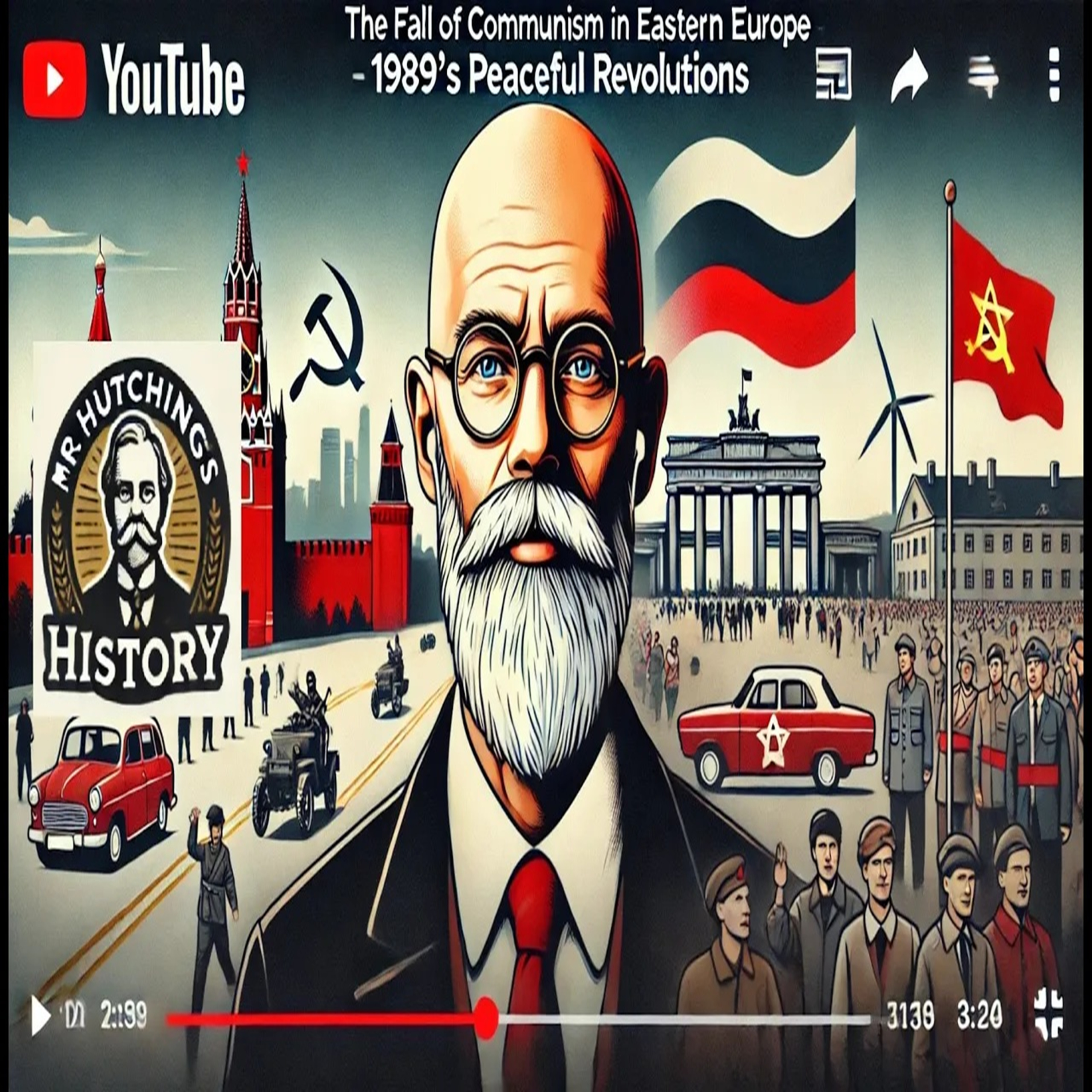 Mr. Hutchings HistoryThe Fall of Communism in Eastern Europe – 1989’s Peaceful RevolutionsWelcome to Mr. Hutchings History, where we analyze pivotal moments that shaped modern history. In today’s episode, we examine the peaceful revolutions of 1989 that led to the fall of communist regimes in Eastern and Central Europe. From Poland to East Germany, Hungary to Czechoslovakia, and Romania's violent uprising, these revolutions redefined the political landscape of Europe.Poland: The Solidarity movement led by Lech Wałęsa set the stage for the fall of communism, with significant influence from Gorbachev’s reforms and the Catholic Church.Hungary: Hungary’s peaceful transition through dialogue, including the reburial of Imre Nagy, symboliz...2024-11-2113 min
Mr. Hutchings HistoryThe Fall of Communism in Eastern Europe – 1989’s Peaceful RevolutionsWelcome to Mr. Hutchings History, where we analyze pivotal moments that shaped modern history. In today’s episode, we examine the peaceful revolutions of 1989 that led to the fall of communist regimes in Eastern and Central Europe. From Poland to East Germany, Hungary to Czechoslovakia, and Romania's violent uprising, these revolutions redefined the political landscape of Europe.Poland: The Solidarity movement led by Lech Wałęsa set the stage for the fall of communism, with significant influence from Gorbachev’s reforms and the Catholic Church.Hungary: Hungary’s peaceful transition through dialogue, including the reburial of Imre Nagy, symboliz...2024-11-2113 min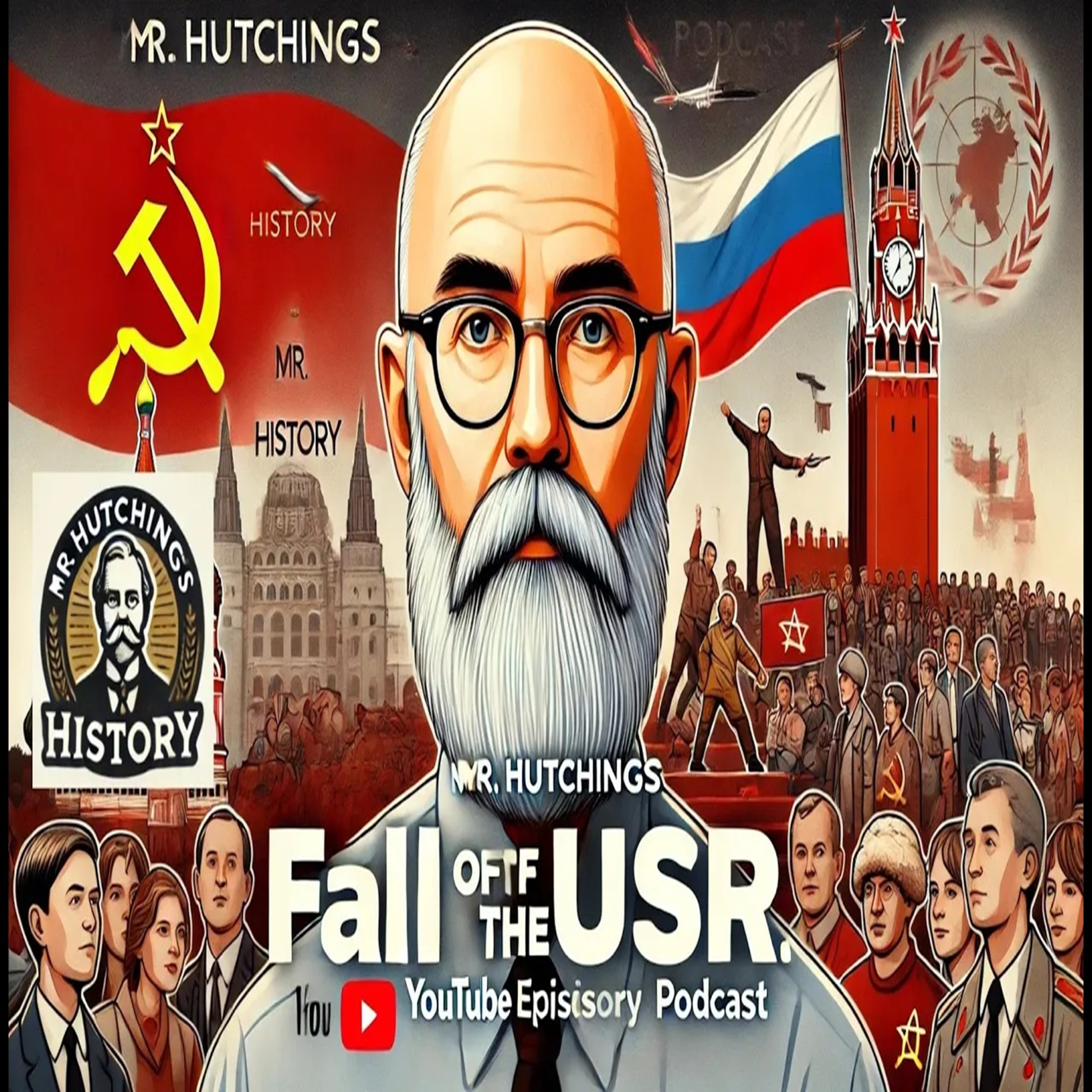 Mr. Hutchings HistoryIdeological Challenges and the Fall of the USSRWelcome to Mr. Hutchings History, where we explore key historical moments. In today’s episode, we examine the ideological challenges that contributed to the collapse of the Soviet Union. We’ll look at the internal disillusionment with communism, the rise of nationalist movements, and the crucial reforms of Mikhail Gorbachev that led to the fall of the USSR and the end of the Cold War.The Decline of Soviet Ideology: By the 1980s, the Soviet Union was facing ideological decay. A crumbling economy and deteriorating living standards made communism less viable, sparking widespread disillusionment.Popular Movements and Nationalist Diss...2024-11-2106 min
Mr. Hutchings HistoryIdeological Challenges and the Fall of the USSRWelcome to Mr. Hutchings History, where we explore key historical moments. In today’s episode, we examine the ideological challenges that contributed to the collapse of the Soviet Union. We’ll look at the internal disillusionment with communism, the rise of nationalist movements, and the crucial reforms of Mikhail Gorbachev that led to the fall of the USSR and the end of the Cold War.The Decline of Soviet Ideology: By the 1980s, the Soviet Union was facing ideological decay. A crumbling economy and deteriorating living standards made communism less viable, sparking widespread disillusionment.Popular Movements and Nationalist Diss...2024-11-2106 min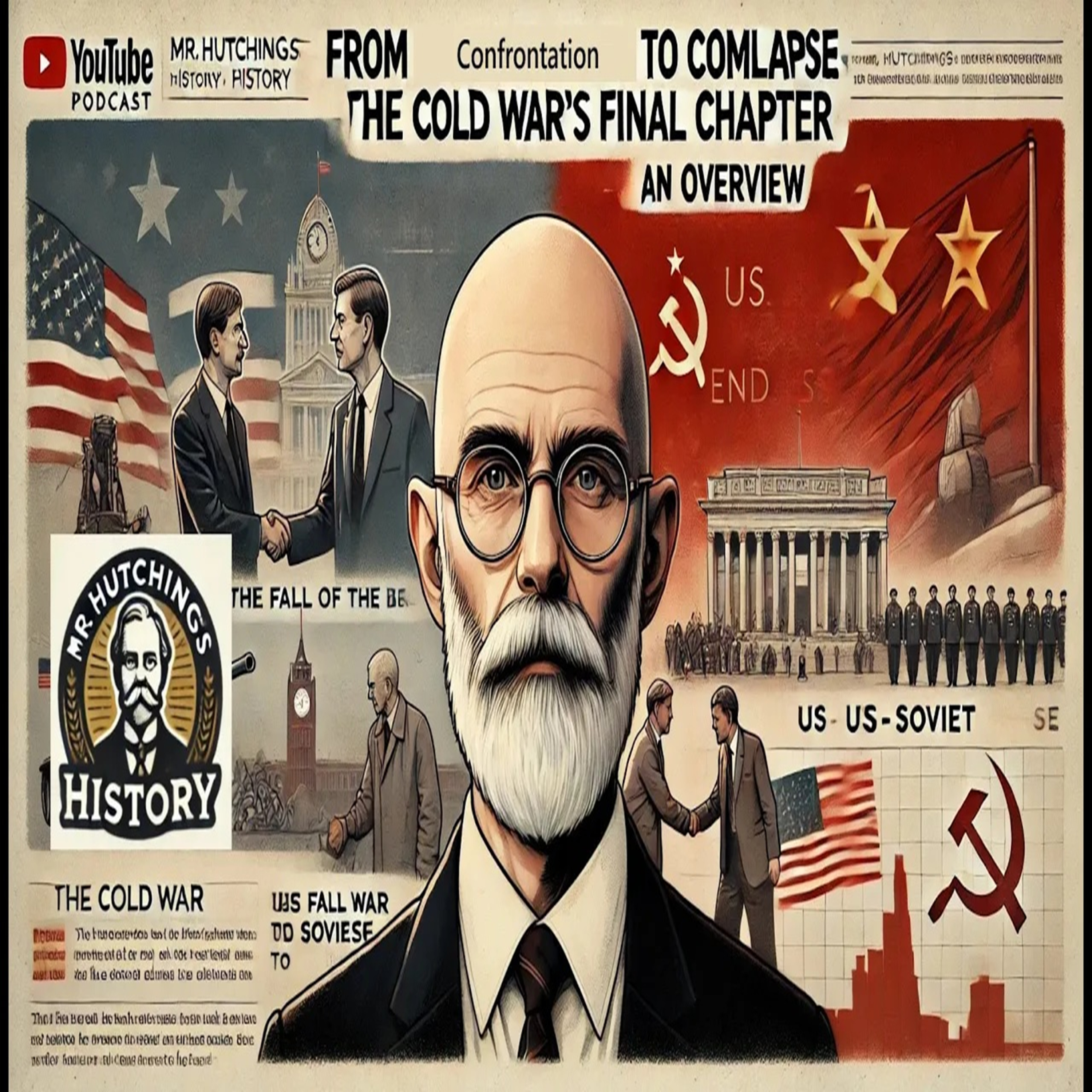 Mr. Hutchings HistoryFrom Confrontation to Collapse—The Cold War’s Final Chapter: An OverviewWelcome to Mr. Hutchings History! In this episode, we dive into the dramatic final chapter of the Cold War, exploring the confrontational 1980s, the role of reconciliation in ending tensions, and the economic and ideological challenges that led to the collapse of the Soviet Union.Key Topics:The hardline stance of President Ronald Reagan and the US military buildupGorbachev's reforms: Perestroika and GlasnostThe INF Treaty and the shift from confrontation to dialogueThe economic struggles of the Soviet Union and their impactIdeological challenges: The fall of Communism in Eastern EuropeWe’ll also critically analyze the hi...2024-11-2112 min
Mr. Hutchings HistoryFrom Confrontation to Collapse—The Cold War’s Final Chapter: An OverviewWelcome to Mr. Hutchings History! In this episode, we dive into the dramatic final chapter of the Cold War, exploring the confrontational 1980s, the role of reconciliation in ending tensions, and the economic and ideological challenges that led to the collapse of the Soviet Union.Key Topics:The hardline stance of President Ronald Reagan and the US military buildupGorbachev's reforms: Perestroika and GlasnostThe INF Treaty and the shift from confrontation to dialogueThe economic struggles of the Soviet Union and their impactIdeological challenges: The fall of Communism in Eastern EuropeWe’ll also critically analyze the hi...2024-11-2112 min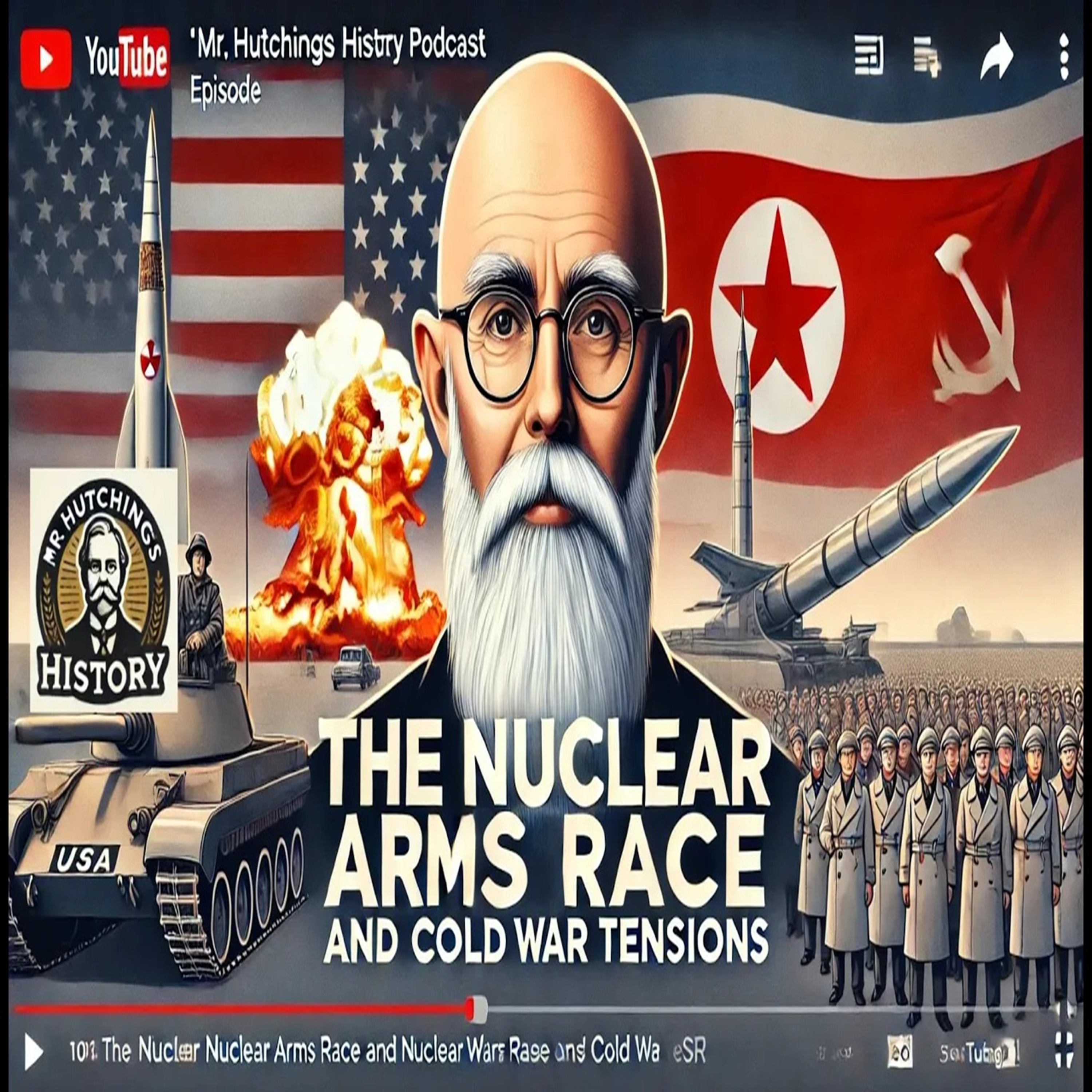 Mr. Hutchings HistoryThe Nuclear Arms Race and Cold War TensionsWelcome to Mr. Hutchings History! In this episode, we delve into one of the defining features of the Cold War: the nuclear arms race. This fierce competition between the United States and the Soviet Union had profound implications for global diplomacy, military strategies, and international relations.We explore:The origins of the nuclear arms race, beginning with the US and Soviet atomic bomb developments.The rise of deterrence strategies like Mutually Assured Destruction (MAD) and the concept of brinkmanship.Key events such as the launch of Sputnik, the myth of the missile gap, and the Cuban...2024-11-2118 min
Mr. Hutchings HistoryThe Nuclear Arms Race and Cold War TensionsWelcome to Mr. Hutchings History! In this episode, we delve into one of the defining features of the Cold War: the nuclear arms race. This fierce competition between the United States and the Soviet Union had profound implications for global diplomacy, military strategies, and international relations.We explore:The origins of the nuclear arms race, beginning with the US and Soviet atomic bomb developments.The rise of deterrence strategies like Mutually Assured Destruction (MAD) and the concept of brinkmanship.Key events such as the launch of Sputnik, the myth of the missile gap, and the Cuban...2024-11-2118 min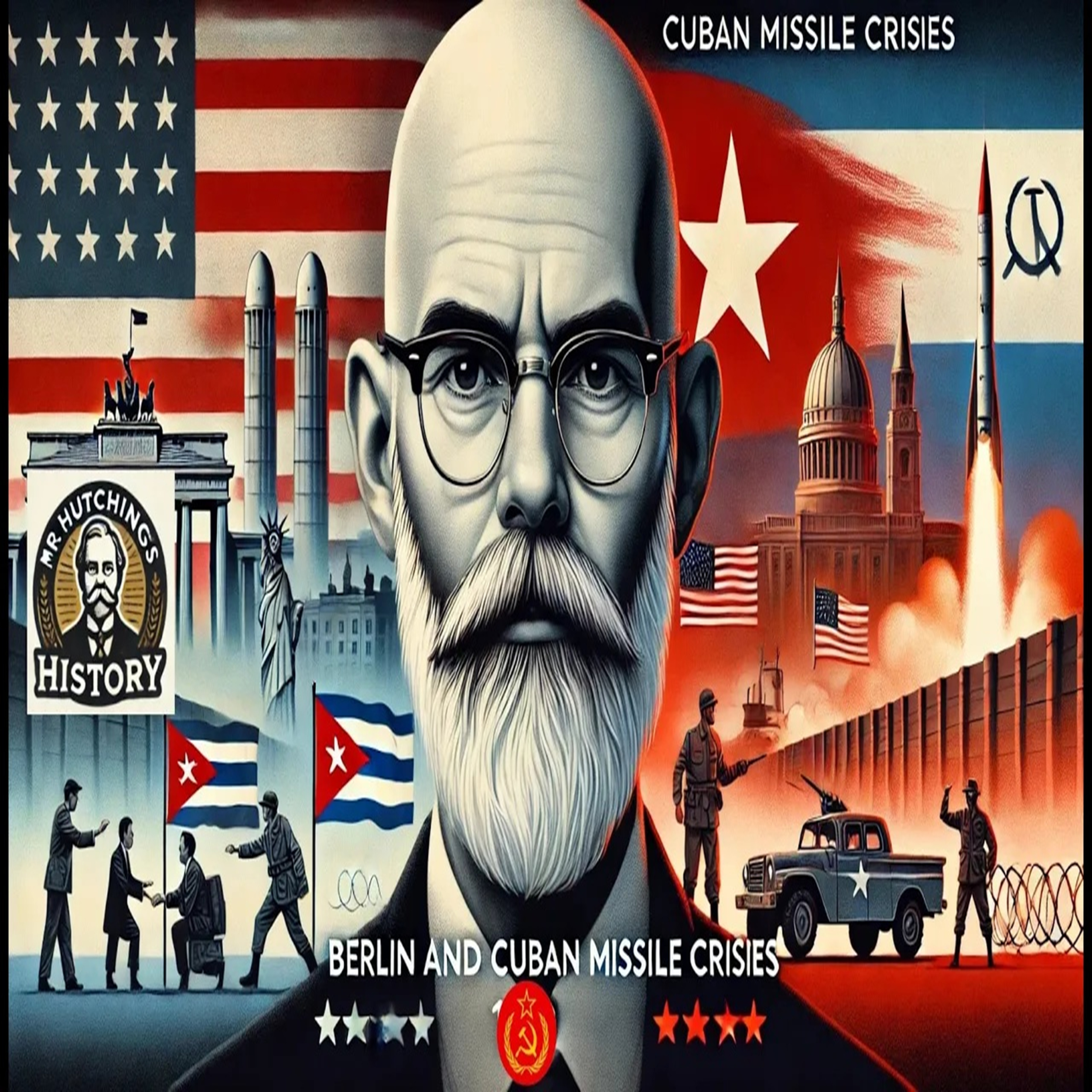 Mr. Hutchings HistoryBerlin and Cuban Missile Crises – Cold War FlashpointsWelcome to Mr. Hutchings History! In this episode, we explore two of the most critical crises of the Cold War: The Berlin Crisis (1958-1961) and the Cuban Missile Crisis (1962). These events brought the United States and the Soviet Union to the brink of nuclear war, forever altering superpower relations.Key topics include:The Berlin Crisis and Khrushchev’s demand for the withdrawal of Western powers from BerlinThe construction of the Berlin Wall and its symbolic representation of the Cold War divideThe Cuban Missile Crisis, the 13-day standoff, and the resolution that averted nuclear conflictThe impact of th...2024-11-2111 min
Mr. Hutchings HistoryBerlin and Cuban Missile Crises – Cold War FlashpointsWelcome to Mr. Hutchings History! In this episode, we explore two of the most critical crises of the Cold War: The Berlin Crisis (1958-1961) and the Cuban Missile Crisis (1962). These events brought the United States and the Soviet Union to the brink of nuclear war, forever altering superpower relations.Key topics include:The Berlin Crisis and Khrushchev’s demand for the withdrawal of Western powers from BerlinThe construction of the Berlin Wall and its symbolic representation of the Cold War divideThe Cuban Missile Crisis, the 13-day standoff, and the resolution that averted nuclear conflictThe impact of th...2024-11-2111 min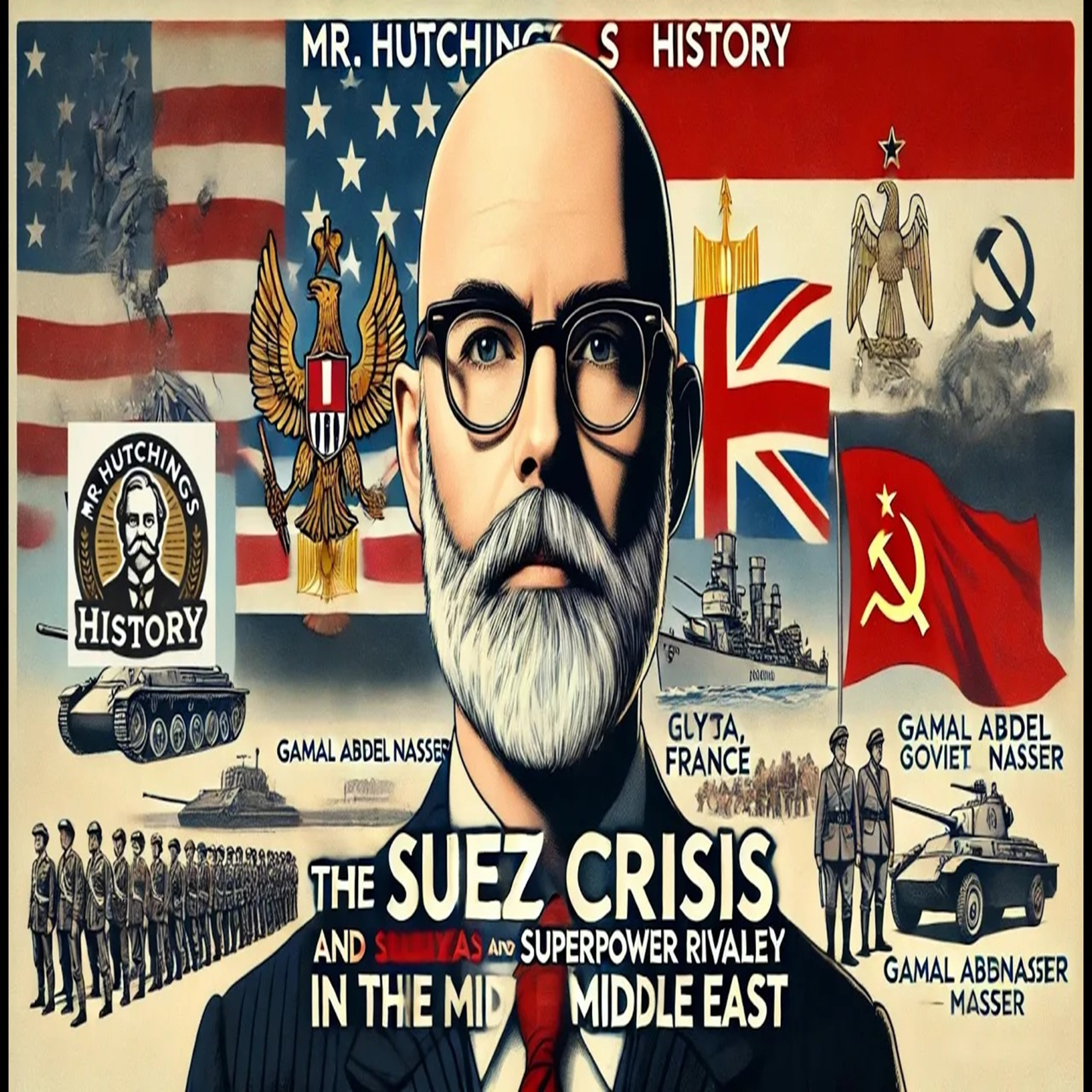 Mr. Hutchings HistoryThe Suez Crisis and Superpower Rivalry in the Middle EastWelcome to Mr. Hutchings History! In today’s episode, we focus on the Suez Crisis of 1956 and its lasting impact on Cold War superpower relations, particularly in the Middle East. The event heightened tensions between the United States and the Soviet Union and set the stage for the Eisenhower Doctrine, shaping future foreign policies and Cold War dynamics.Key topics include:The causes of the Suez Crisis and Nasser’s nationalization of the Suez CanalThe US and Soviet responses and the challenges to British and French influenceThe introduction of the Eisenhower Doctrine and its implications for the...2024-11-2108 min
Mr. Hutchings HistoryThe Suez Crisis and Superpower Rivalry in the Middle EastWelcome to Mr. Hutchings History! In today’s episode, we focus on the Suez Crisis of 1956 and its lasting impact on Cold War superpower relations, particularly in the Middle East. The event heightened tensions between the United States and the Soviet Union and set the stage for the Eisenhower Doctrine, shaping future foreign policies and Cold War dynamics.Key topics include:The causes of the Suez Crisis and Nasser’s nationalization of the Suez CanalThe US and Soviet responses and the challenges to British and French influenceThe introduction of the Eisenhower Doctrine and its implications for the...2024-11-2108 min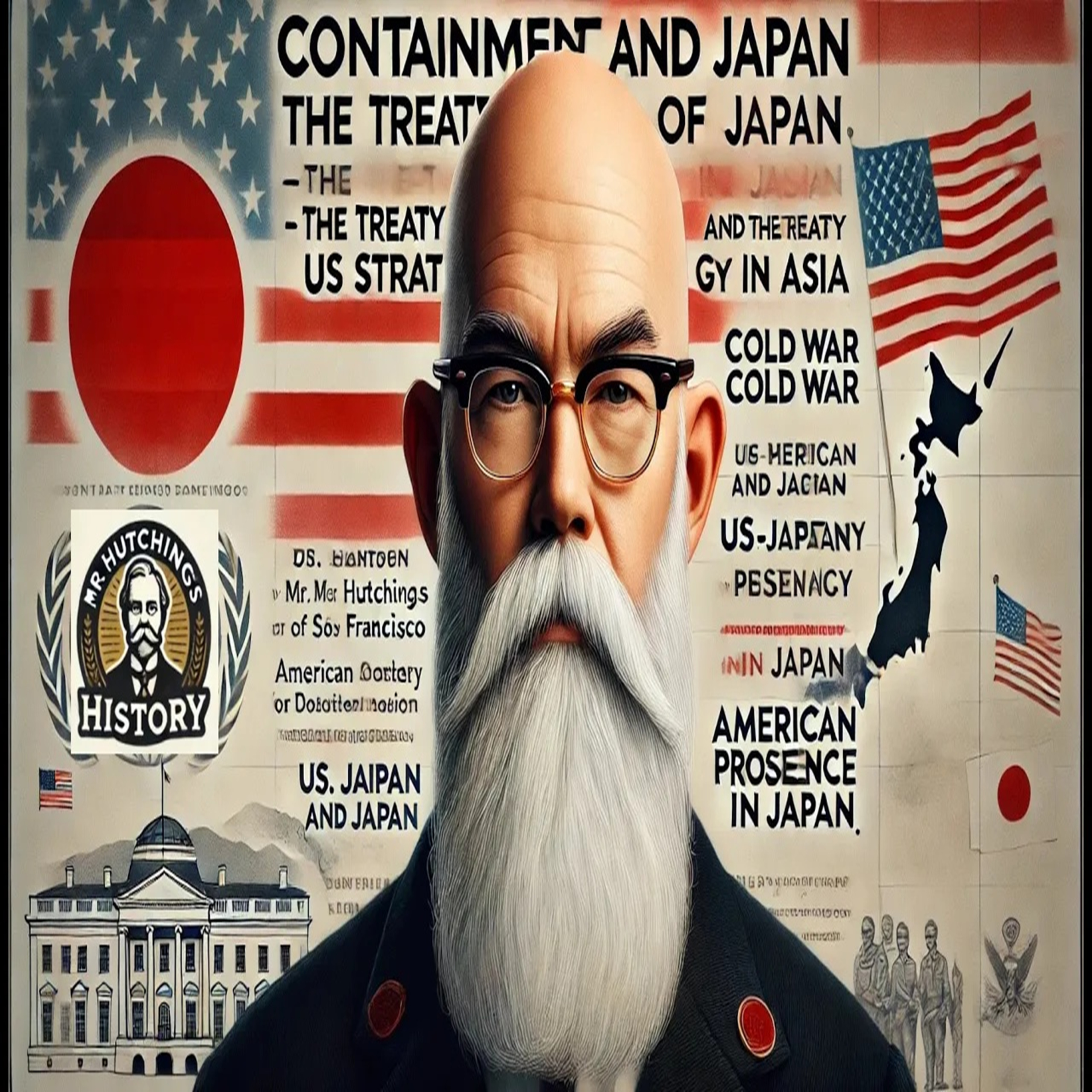 Mr. Hutchings HistoryContainment and Japan – The Treaty of San Francisco and the US Strategy in AsiaWelcome back to Mr. Hutchings History! In today’s episode, we explore the US policy of containment in Asia, specifically focusing on Japan and the Treaty of San Francisco. We’ll examine the post-WWII US occupation of Japan, its transformation into a capitalist democracy, and how Japan's role in the Cold War evolved. The episode also dives into historical interpretations from different schools of thought, analyzing the effectiveness of the US strategy and Japan's response.We’ll discuss how the Treaty of San Francisco (1951) redefined Japan’s role in the Cold War and allowed the US to maintain...2024-11-2113 min
Mr. Hutchings HistoryContainment and Japan – The Treaty of San Francisco and the US Strategy in AsiaWelcome back to Mr. Hutchings History! In today’s episode, we explore the US policy of containment in Asia, specifically focusing on Japan and the Treaty of San Francisco. We’ll examine the post-WWII US occupation of Japan, its transformation into a capitalist democracy, and how Japan's role in the Cold War evolved. The episode also dives into historical interpretations from different schools of thought, analyzing the effectiveness of the US strategy and Japan's response.We’ll discuss how the Treaty of San Francisco (1951) redefined Japan’s role in the Cold War and allowed the US to maintain...2024-11-2113 min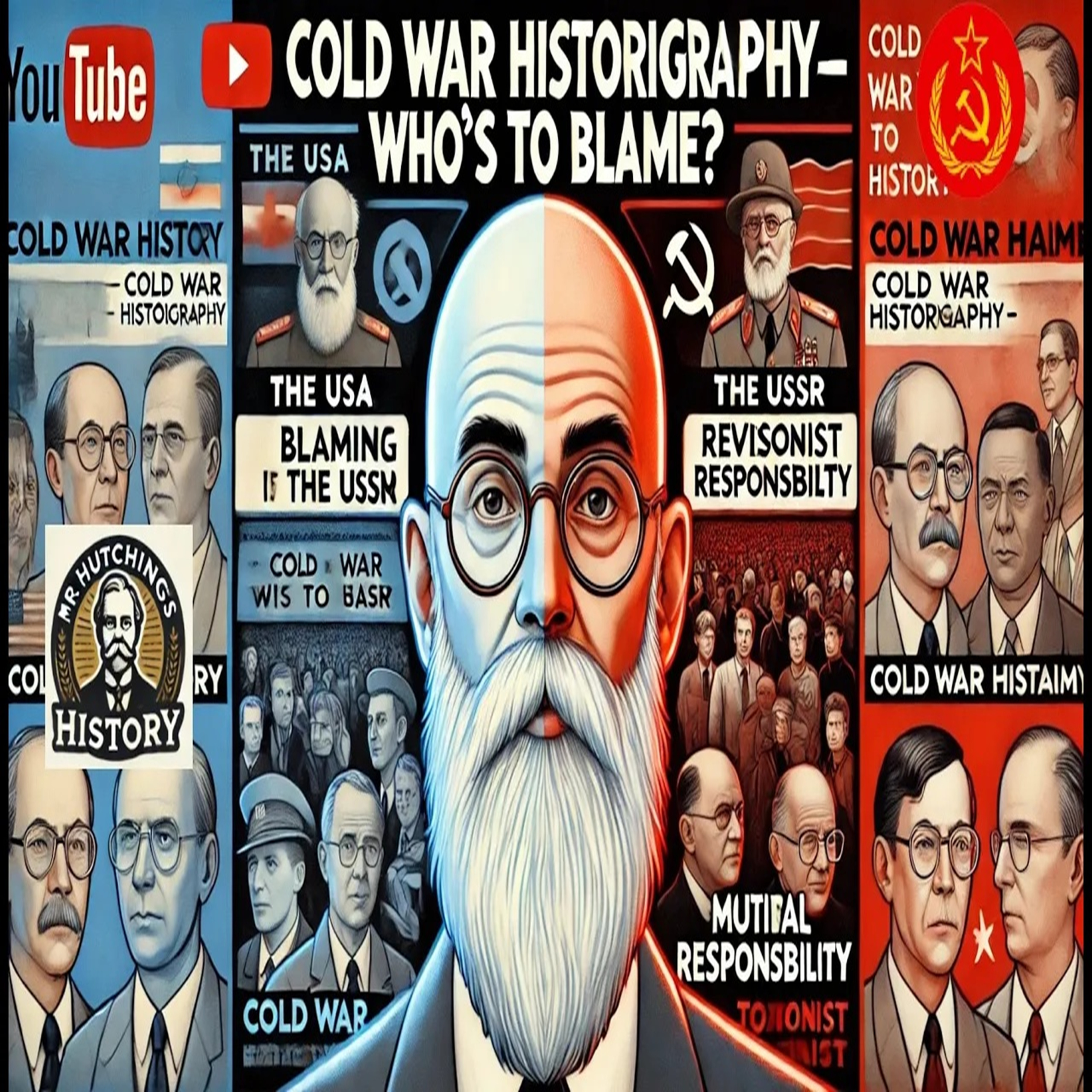 Mr. Hutchings HistoryCold War Historiography – Who’s to Blame?Welcome to Mr. Hutchings History! In this episode, we tackle the controversial question: Who was responsible for the Cold War? Was it Soviet expansionism, US economic interests, or a combination of both? We'll dive into four schools of thought—Orthodox, Revisionist, Post-Revisionist, and Post-Cold War—exploring how each interprets the origins of the Cold War. From Stalin’s aggressive policies to the US’s economic strategies, we’ll analyze key events like the Berlin Blockade, the Marshall Plan, and the role of Stalin’s personality in fueling the conflict.Join us as we break down the ideological, economic, an...2024-11-2116 min
Mr. Hutchings HistoryCold War Historiography – Who’s to Blame?Welcome to Mr. Hutchings History! In this episode, we tackle the controversial question: Who was responsible for the Cold War? Was it Soviet expansionism, US economic interests, or a combination of both? We'll dive into four schools of thought—Orthodox, Revisionist, Post-Revisionist, and Post-Cold War—exploring how each interprets the origins of the Cold War. From Stalin’s aggressive policies to the US’s economic strategies, we’ll analyze key events like the Berlin Blockade, the Marshall Plan, and the role of Stalin’s personality in fueling the conflict.Join us as we break down the ideological, economic, an...2024-11-2116 min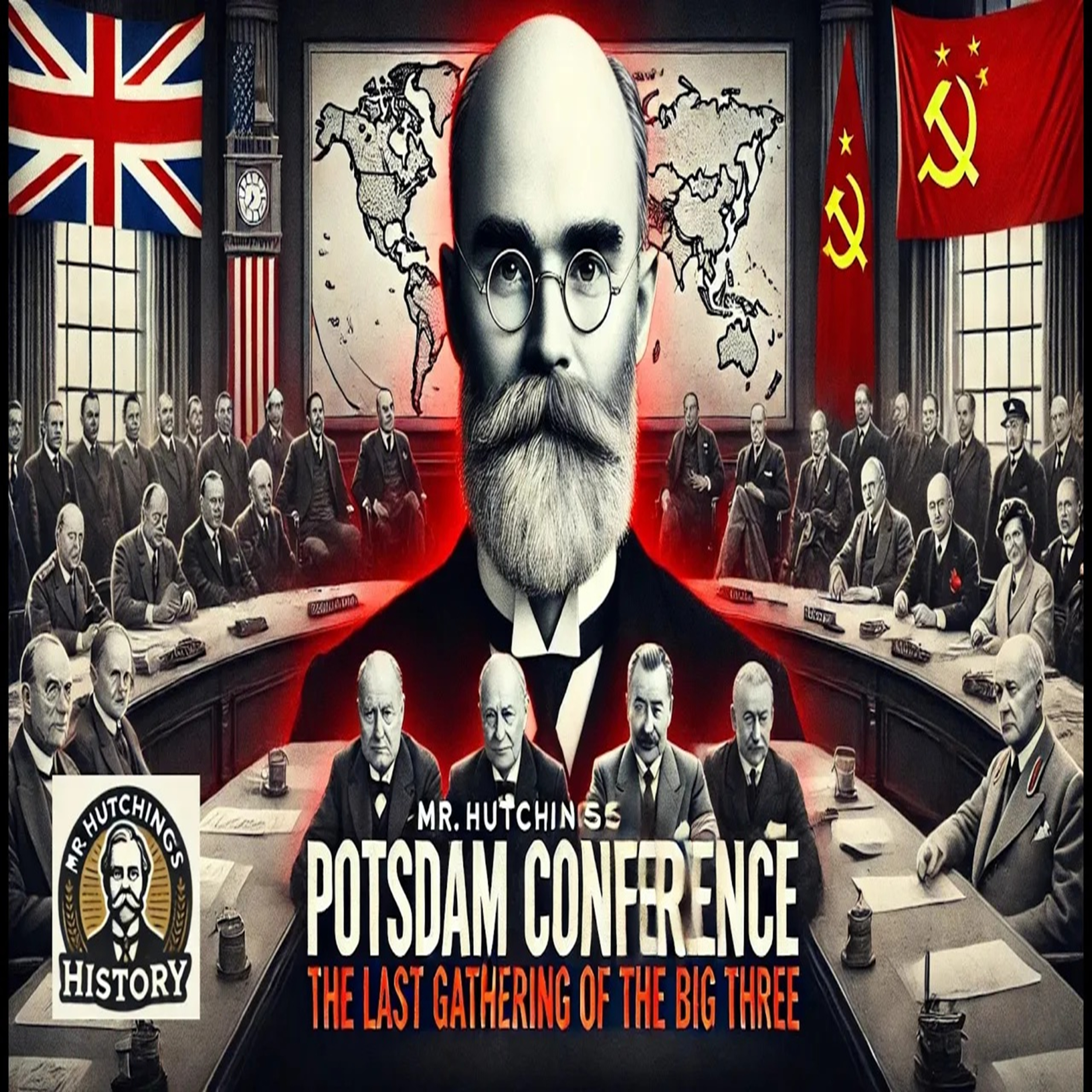 Mr. Hutchings HistoryPotsdam Conference – The Last Gathering of the Big ThreeWelcome toMr. Hutchings History! In this episode, we dive into the Potsdam Conference of July 1945, the final meeting of the Big Three—Roosevelt, Stalin, and Churchill. As World War II ended, the discussions held at Potsdam would not only shape post-war Europe but also expose the growing tensions between the United States and the Soviet Union, setting the stage for the Cold War.We'll cover key decisions made on the future of Germany, Poland, and Eastern Europe, and how the successful test of the atomic bomb altered power dynamics. With new leadership, particularly Truman's tougher stance, and St...2024-11-2112 min
Mr. Hutchings HistoryPotsdam Conference – The Last Gathering of the Big ThreeWelcome toMr. Hutchings History! In this episode, we dive into the Potsdam Conference of July 1945, the final meeting of the Big Three—Roosevelt, Stalin, and Churchill. As World War II ended, the discussions held at Potsdam would not only shape post-war Europe but also expose the growing tensions between the United States and the Soviet Union, setting the stage for the Cold War.We'll cover key decisions made on the future of Germany, Poland, and Eastern Europe, and how the successful test of the atomic bomb altered power dynamics. With new leadership, particularly Truman's tougher stance, and St...2024-11-2112 min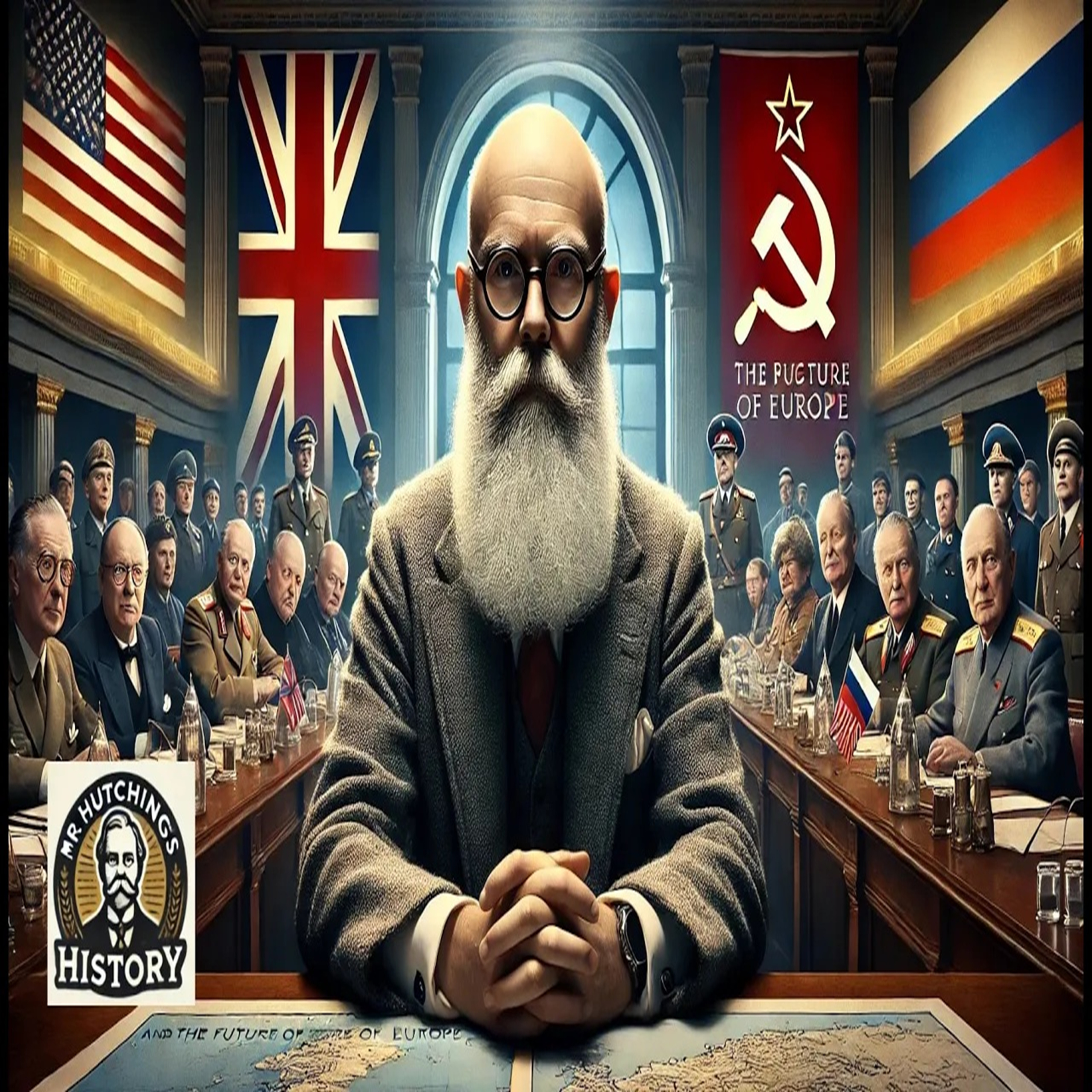 Mr. Hutchings HistoryYalta Conference, 1945 – The Big Three and the Future of EuropeWelcome toMr. Hutchings History! In today’s episode, we focus on the Yalta Conference of 1945, where Franklin D. Roosevelt, Winston Churchill, and Joseph Stalin met to discuss the post-war order of Europe. This critical conference was marked by cooperation against Nazi Germany but also revealed growing tensions that would define the Cold War.We’ll examine key issues, such as the division of Germany, the future of Poland, and Soviet territorial gains in Eastern Europe. Stalin sought to secure Soviet influence, while the Western Allies aimed to preserve democracy and prevent Soviet expansion. We’ll also explore the cr...2024-11-2113 min
Mr. Hutchings HistoryYalta Conference, 1945 – The Big Three and the Future of EuropeWelcome toMr. Hutchings History! In today’s episode, we focus on the Yalta Conference of 1945, where Franklin D. Roosevelt, Winston Churchill, and Joseph Stalin met to discuss the post-war order of Europe. This critical conference was marked by cooperation against Nazi Germany but also revealed growing tensions that would define the Cold War.We’ll examine key issues, such as the division of Germany, the future of Poland, and Soviet territorial gains in Eastern Europe. Stalin sought to secure Soviet influence, while the Western Allies aimed to preserve democracy and prevent Soviet expansion. We’ll also explore the cr...2024-11-2113 min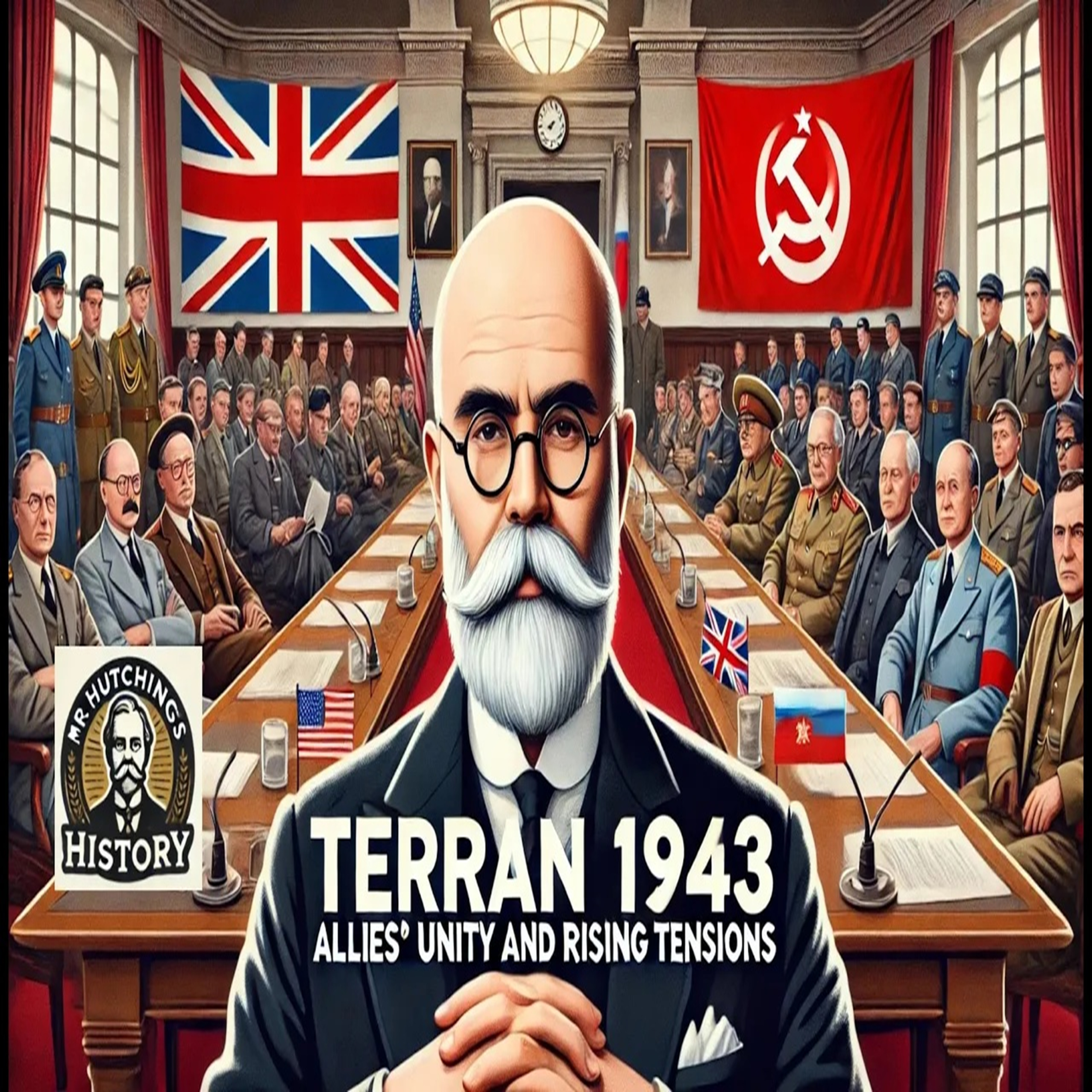 Mr. Hutchings HistoryTehran 1943—Allies’ Unity and Rising TensionsWelcome toMr. Hutchings History! In today’s episode, we dive into the Tehran Conference of 1943, where the Allies—Roosevelt, Churchill, and Stalin—met to discuss the strategy for the final phase of World War II. While the conference showcased unity in defeating Nazi Germany, it also exposed deepening ideological divides, foreshadowing the Cold War.We’ll examine key issues from Tehran, including Stalin’s demand for a second front in Western Europe, tensions over the future of Poland, and disagreements about post-war Germany. The conference also marked the beginning of Soviet territorial expansion in Eastern Europe, leading to future...2024-11-2115 min
Mr. Hutchings HistoryTehran 1943—Allies’ Unity and Rising TensionsWelcome toMr. Hutchings History! In today’s episode, we dive into the Tehran Conference of 1943, where the Allies—Roosevelt, Churchill, and Stalin—met to discuss the strategy for the final phase of World War II. While the conference showcased unity in defeating Nazi Germany, it also exposed deepening ideological divides, foreshadowing the Cold War.We’ll examine key issues from Tehran, including Stalin’s demand for a second front in Western Europe, tensions over the future of Poland, and disagreements about post-war Germany. The conference also marked the beginning of Soviet territorial expansion in Eastern Europe, leading to future...2024-11-2115 min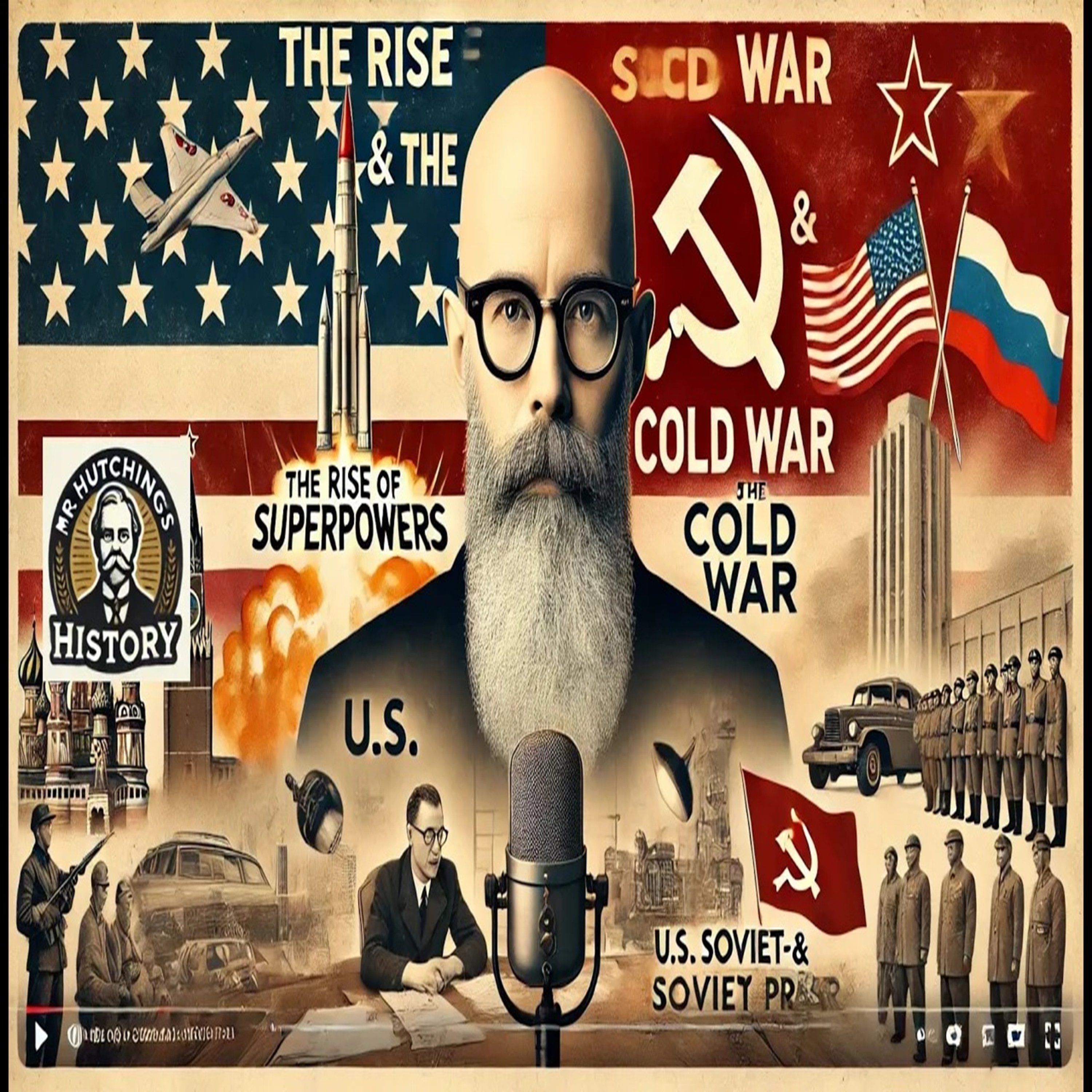 Mr. Hutchings HistoryThe Rise of Superpowers and the Origins of the Cold War: An OverviewWelcome toMr. Hutchings History. In this episode, we explore the origins of the Cold War, one of the most defining conflicts of the 20th century. We’ll examine how the US and USSR emerged as superpowers by 1945, and how wartime conferences like Yalta and Potsdam set the stage for superpower rivalry. What were the key ideological differences that led to tensions? Why did Europe become politically and militarily divided by 1949? We’ll delve into the breakdown of the Grand Alliance and the division of Europe, analyzing key events like the Berlin Blockade and the Marshall Plan.Through a mi...2024-11-2108 min
Mr. Hutchings HistoryThe Rise of Superpowers and the Origins of the Cold War: An OverviewWelcome toMr. Hutchings History. In this episode, we explore the origins of the Cold War, one of the most defining conflicts of the 20th century. We’ll examine how the US and USSR emerged as superpowers by 1945, and how wartime conferences like Yalta and Potsdam set the stage for superpower rivalry. What were the key ideological differences that led to tensions? Why did Europe become politically and militarily divided by 1949? We’ll delve into the breakdown of the Grand Alliance and the division of Europe, analyzing key events like the Berlin Blockade and the Marshall Plan.Through a mi...2024-11-2108 min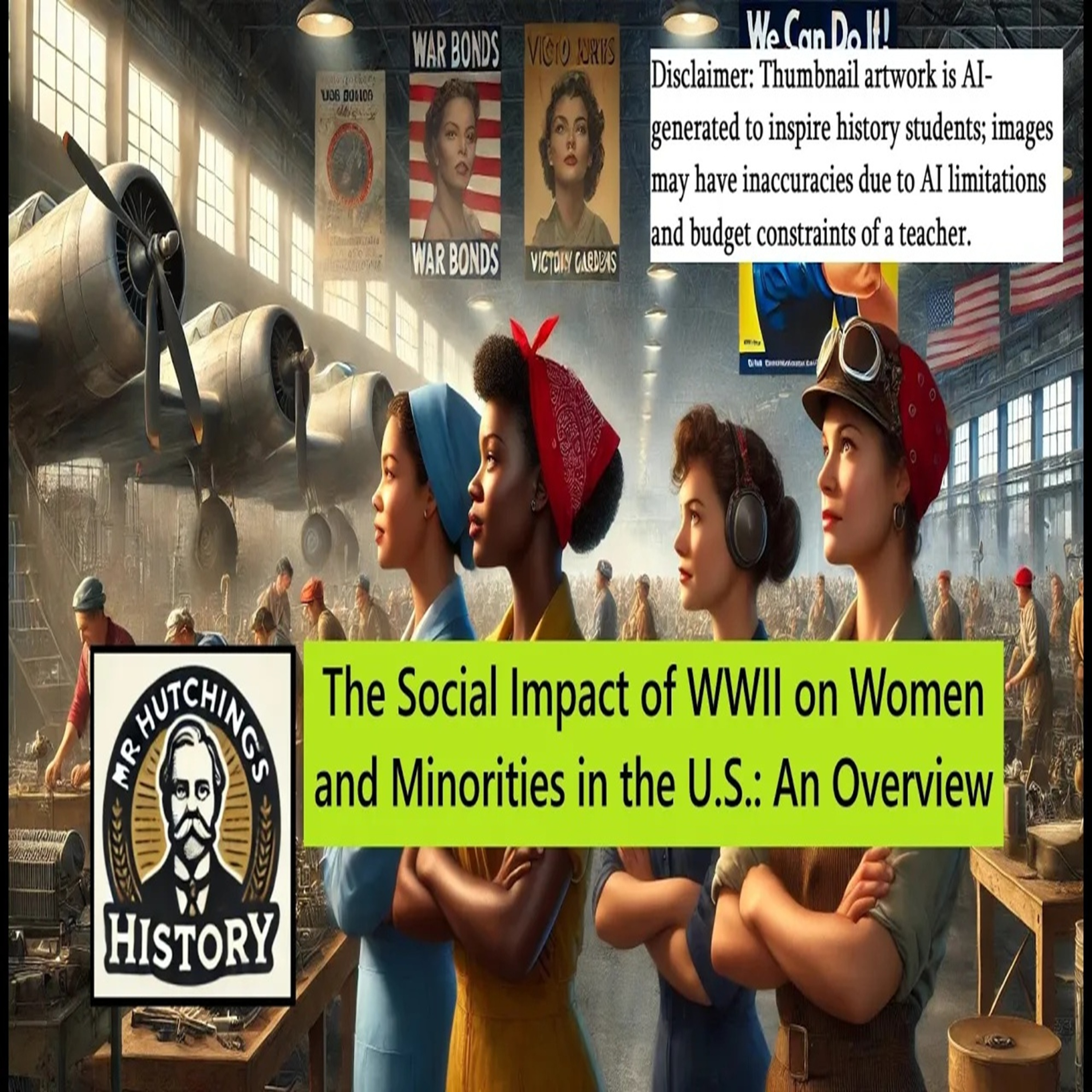 Mr. Hutchings HistoryThe Social Impact of WWII on Women and Minorities in the U.S.: An OverviewWelcome to Mr. Hutchings History! In this episode, we explore how World War II reshaped American society, focusing on the transformative roles of women, African Americans, Hispanic Americans, and Native Americans. From Rosie the Riveter symbolizing women’s entry into the workforce to the heroic contributions of the Tuskegee Airmen and Navajo Code Talkers, we examine how these groups broke barriers and faced challenges during the war.
Discover the impact of Executive Order 8802, which opened opportunities for African Americans in defense industries, the Bracero Program’s role for Hispanic laborers, and Native Americans’ contributions as soldiers and codebr...2024-11-2125 min
Mr. Hutchings HistoryThe Social Impact of WWII on Women and Minorities in the U.S.: An OverviewWelcome to Mr. Hutchings History! In this episode, we explore how World War II reshaped American society, focusing on the transformative roles of women, African Americans, Hispanic Americans, and Native Americans. From Rosie the Riveter symbolizing women’s entry into the workforce to the heroic contributions of the Tuskegee Airmen and Navajo Code Talkers, we examine how these groups broke barriers and faced challenges during the war.
Discover the impact of Executive Order 8802, which opened opportunities for African Americans in defense industries, the Bracero Program’s role for Hispanic laborers, and Native Americans’ contributions as soldiers and codebr...2024-11-2125 min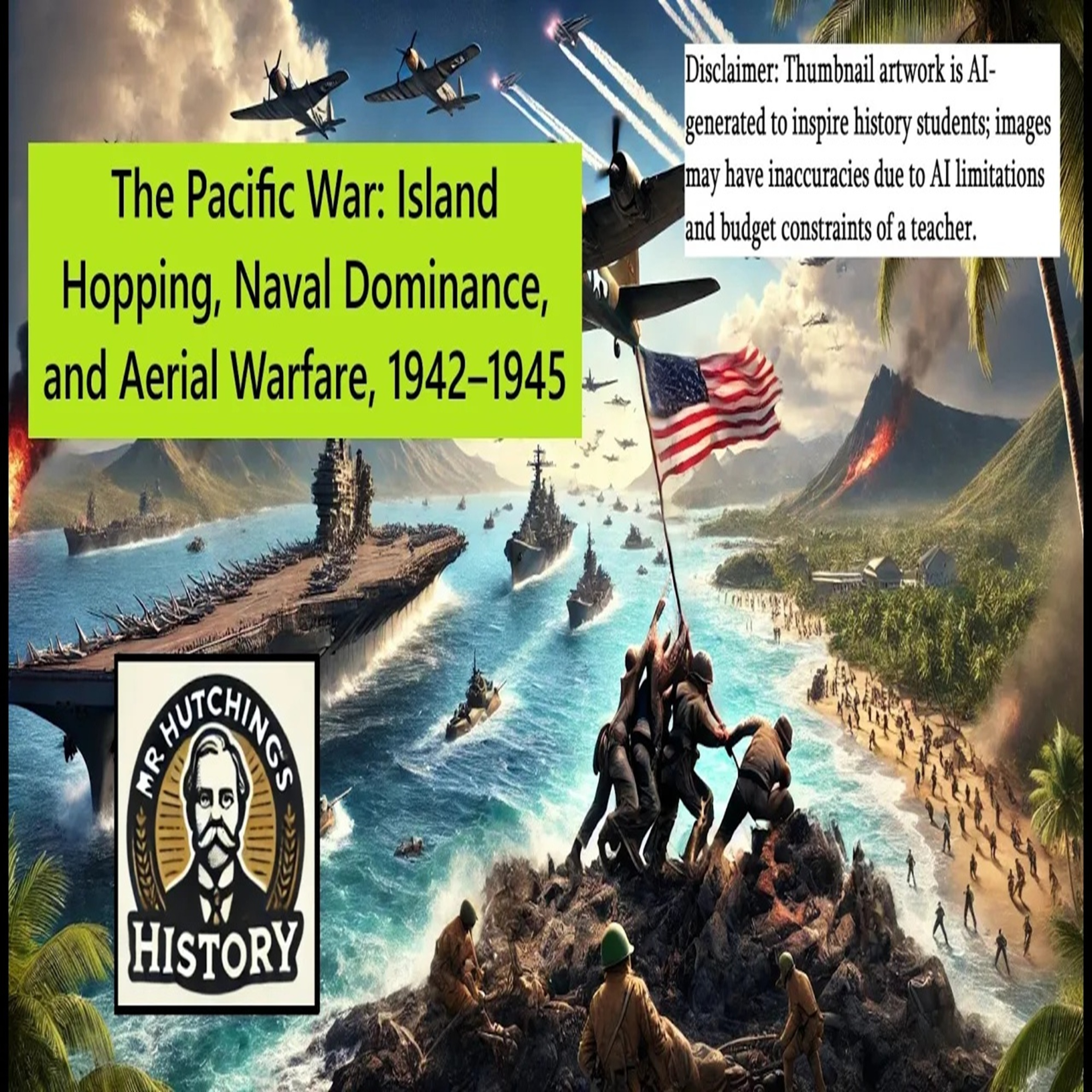 Mr. Hutchings HistoryThe Pacific War: Island Hopping, Naval Dominance, and Aerial Warfare, 1942–1945Welcome to Mr. Hutchings History! In this episode, we explore the Pacific War from June 1942 to July 1945, analyzing the U.S. strategy and Japan's response after Midway. We’ll delve into the brutal island-hopping campaigns, naval battles like Leyte Gulf, and the devastating aerial bombardments of Japanese cities. Key topics include the U.S.'s amphibious landings at Guadalcanal, Iwo Jima, and Okinawa, the effectiveness of kamikaze attacks, and the role of strategic bombing, including the atomic bombings of Hiroshima and Nagasaki.
Drawing on historiographical perspectives from scholars like Samuel Eliot Morison, John W. Dower, and Max Ha...2024-11-2118 min
Mr. Hutchings HistoryThe Pacific War: Island Hopping, Naval Dominance, and Aerial Warfare, 1942–1945Welcome to Mr. Hutchings History! In this episode, we explore the Pacific War from June 1942 to July 1945, analyzing the U.S. strategy and Japan's response after Midway. We’ll delve into the brutal island-hopping campaigns, naval battles like Leyte Gulf, and the devastating aerial bombardments of Japanese cities. Key topics include the U.S.'s amphibious landings at Guadalcanal, Iwo Jima, and Okinawa, the effectiveness of kamikaze attacks, and the role of strategic bombing, including the atomic bombings of Hiroshima and Nagasaki.
Drawing on historiographical perspectives from scholars like Samuel Eliot Morison, John W. Dower, and Max Ha...2024-11-2118 min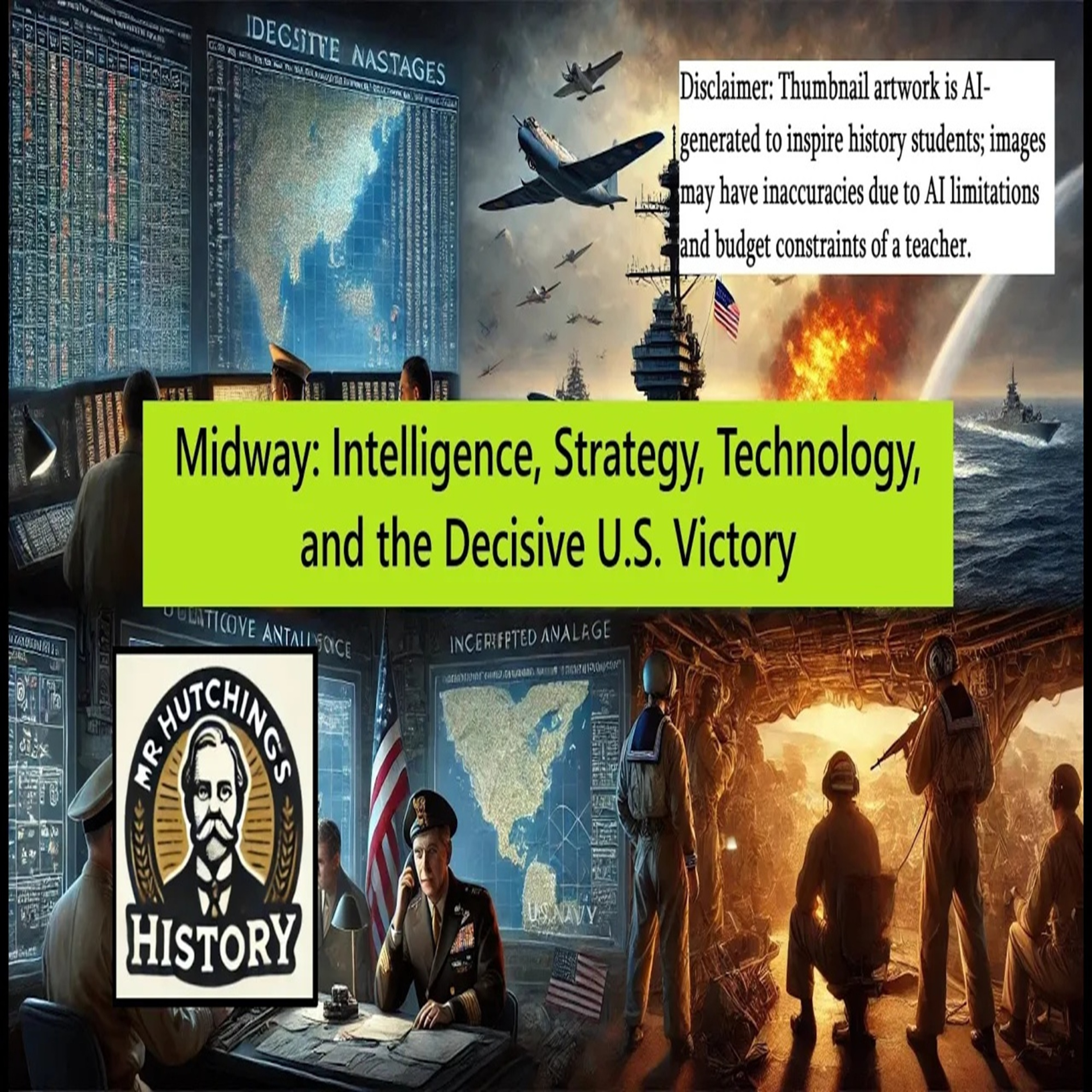 Mr. Hutchings HistoryMidway: Intelligence, Strategy, Technology, and the Decisive U.S. VictoryWelcome to Mr. Hutchings History! In this episode, we analyze the Battle of Midway (June 3–6, 1942), a turning point in World War II’s Pacific theater. Discover how U.S. intelligence, leadership, and technological advancements enabled a decisive victory over Japan. We’ll unpack Admiral Nimitz’s strategic use of codebreaking, the critical role of the Douglas SBD Dauntless dive bombers, and the tactical errors made by Admiral Nagumo.
Japan’s ambitions for Pacific dominance clashed with American resilience, resulting in the loss of four Japanese carriers and over 200 elite pilots. Drawing from historians like Andrew Roberts, Richard Overy, and...2024-11-2109 min
Mr. Hutchings HistoryMidway: Intelligence, Strategy, Technology, and the Decisive U.S. VictoryWelcome to Mr. Hutchings History! In this episode, we analyze the Battle of Midway (June 3–6, 1942), a turning point in World War II’s Pacific theater. Discover how U.S. intelligence, leadership, and technological advancements enabled a decisive victory over Japan. We’ll unpack Admiral Nimitz’s strategic use of codebreaking, the critical role of the Douglas SBD Dauntless dive bombers, and the tactical errors made by Admiral Nagumo.
Japan’s ambitions for Pacific dominance clashed with American resilience, resulting in the loss of four Japanese carriers and over 200 elite pilots. Drawing from historians like Andrew Roberts, Richard Overy, and...2024-11-2109 min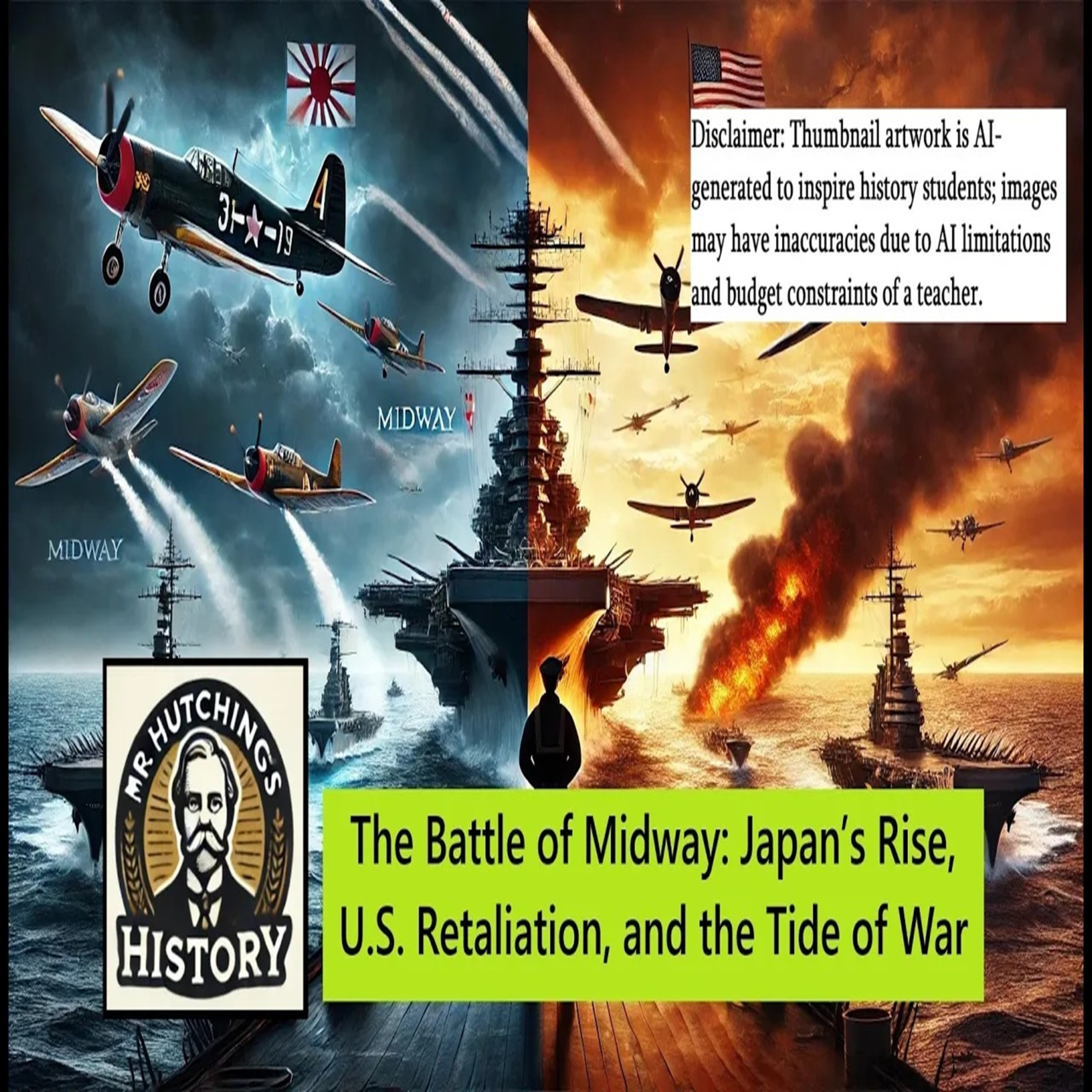 Mr. Hutchings HistoryThe Battle of Midway: Japan’s Rise, U.S. Retaliation, and the Tide of WarWelcome to Mr. Hutchings History! In this episode, we explore the pivotal Battle of Midway, a defining moment in World War II’s Pacific theater. Discover how Japan’s early naval dominance and expansive ambitions set the stage for this confrontation, and how the U.S. turned the tide through intelligence, strategy, and resilience.
We analyze Japan’s naval strengths, America’s recovery after Pearl Harbor, and the role of cryptanalysis in foiling Admiral Yamamoto’s plan. With the loss of four Japanese carriers and their elite pilots, the battle marked a turning point that forced Japan into a def...2024-11-2112 min
Mr. Hutchings HistoryThe Battle of Midway: Japan’s Rise, U.S. Retaliation, and the Tide of WarWelcome to Mr. Hutchings History! In this episode, we explore the pivotal Battle of Midway, a defining moment in World War II’s Pacific theater. Discover how Japan’s early naval dominance and expansive ambitions set the stage for this confrontation, and how the U.S. turned the tide through intelligence, strategy, and resilience.
We analyze Japan’s naval strengths, America’s recovery after Pearl Harbor, and the role of cryptanalysis in foiling Admiral Yamamoto’s plan. With the loss of four Japanese carriers and their elite pilots, the battle marked a turning point that forced Japan into a def...2024-11-2112 min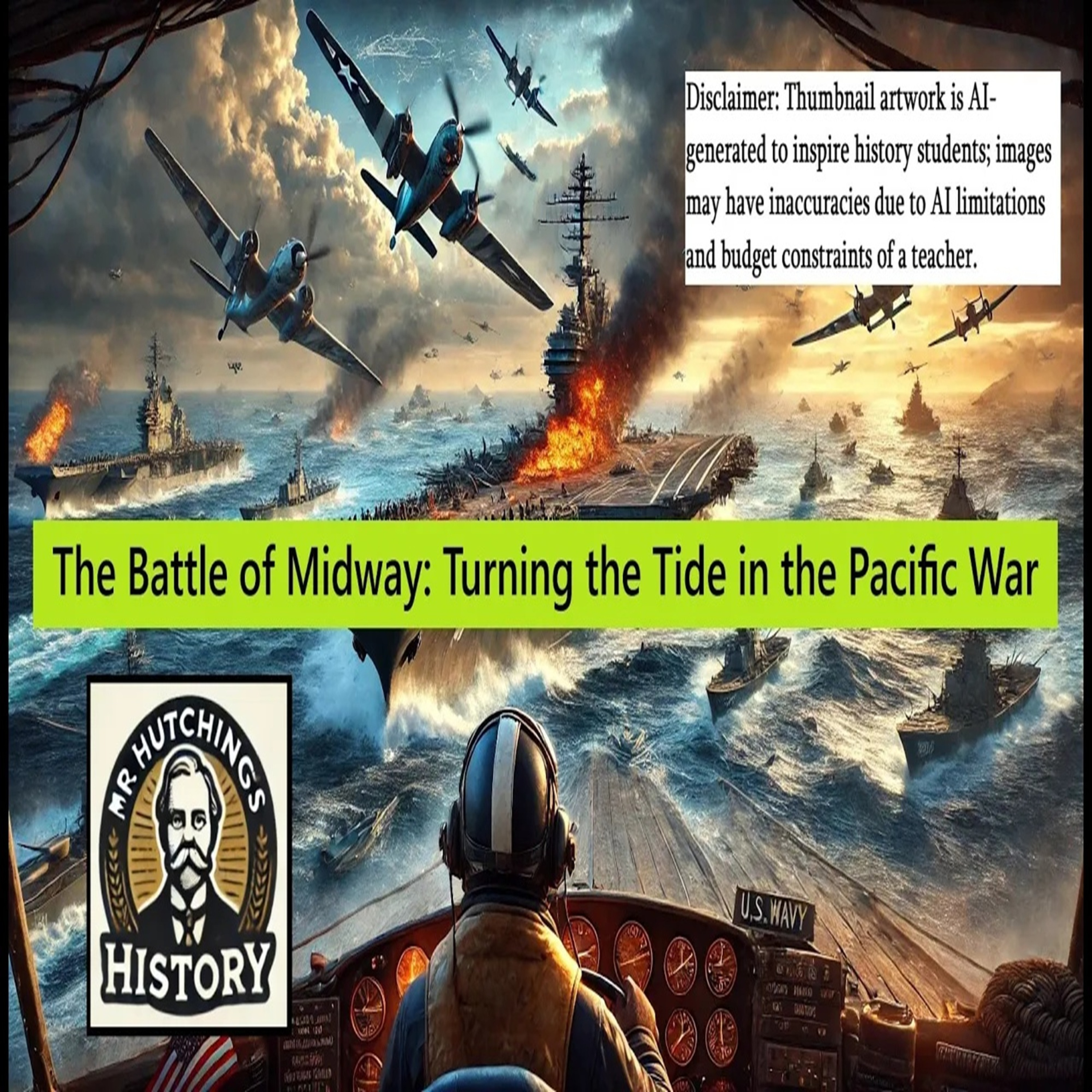 Mr. Hutchings HistoryThe Battle of Midway: Turning the Tide in the Pacific WarWelcome to Mr. Hutchings History! In this episode, we examine the Battle of Midway, one of the most decisive naval engagements of World War II. Fought in June 1942, this battle marked a turning point in the Pacific, shifting the momentum toward the Allies. We explore the events leading up to Midway, the strategic importance of the atoll, and the role of U.S. intelligence in foiling Japan's plans.
Learn how the destruction of four Japanese carriers and the loss of experienced pilots forced Japan into a defensive posture for the rest of the war. Using insights from...2024-11-2124 min
Mr. Hutchings HistoryThe Battle of Midway: Turning the Tide in the Pacific WarWelcome to Mr. Hutchings History! In this episode, we examine the Battle of Midway, one of the most decisive naval engagements of World War II. Fought in June 1942, this battle marked a turning point in the Pacific, shifting the momentum toward the Allies. We explore the events leading up to Midway, the strategic importance of the atoll, and the role of U.S. intelligence in foiling Japan's plans.
Learn how the destruction of four Japanese carriers and the loss of experienced pilots forced Japan into a defensive posture for the rest of the war. Using insights from...2024-11-2124 min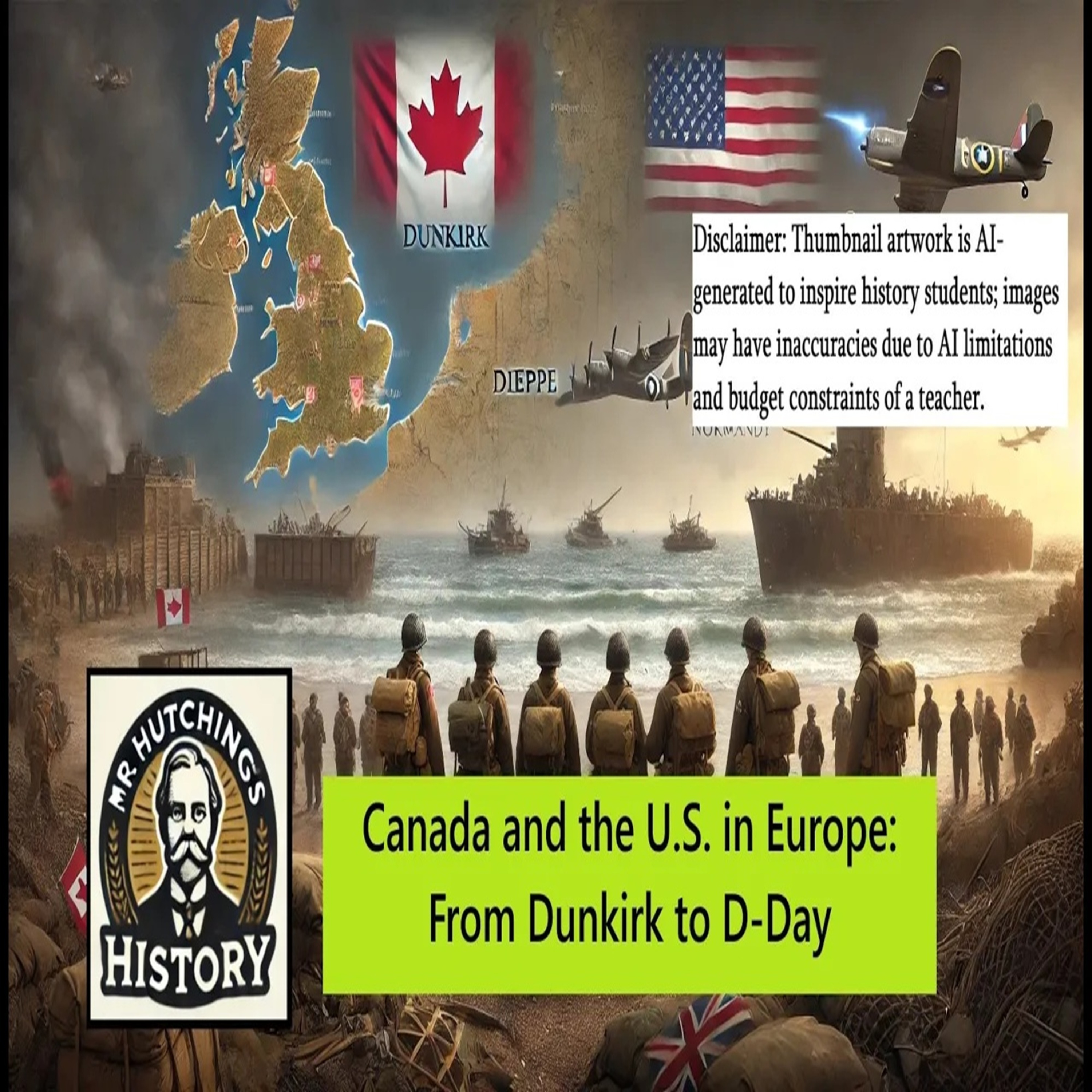 Mr. Hutchings HistoryCanada and the U.S. in Europe: From Dunkirk to D-DayWelcome to Mr. Hutchings History! In this episode, we explore the critical roles of Canada and the United States in World War II’s European theater, from Canada’s early commitment in 1939 to the decisive D-Day landings of 1944. Learn how Canada’s participation in Dunkirk, the Dieppe Raid, and Juno Beach shaped the Allied fight against Nazi Germany.
Discover the U.S.’s entry into the war after Pearl Harbor, its strategic campaigns in North Africa and Italy, and its pivotal role in Operation Overlord. We’ll examine key turning points, such as the Normandy landings, and discuss th...2024-11-2118 min
Mr. Hutchings HistoryCanada and the U.S. in Europe: From Dunkirk to D-DayWelcome to Mr. Hutchings History! In this episode, we explore the critical roles of Canada and the United States in World War II’s European theater, from Canada’s early commitment in 1939 to the decisive D-Day landings of 1944. Learn how Canada’s participation in Dunkirk, the Dieppe Raid, and Juno Beach shaped the Allied fight against Nazi Germany.
Discover the U.S.’s entry into the war after Pearl Harbor, its strategic campaigns in North Africa and Italy, and its pivotal role in Operation Overlord. We’ll examine key turning points, such as the Normandy landings, and discuss th...2024-11-2118 min Mr. Hutchings HistoryPearl Harbor: Roosevelt’s Response and the U.S. Path to WarWelcome to Mr. Hutchings History! In this episode, we delve into the pivotal attack on Pearl Harbor and President Franklin D. Roosevelt’s decisive response that brought the United States into World War II. We analyze the events of December 7, 1941, Roosevelt’s iconic "Day of Infamy" speech, and the rapid mobilization of U.S. resources that transformed the nation into the "Arsenal of Democracy."
Explore the broader geopolitical factors, from Japan’s imperial ambitions and the U.S. oil embargo to the breakdown of diplomacy, as well as varying historiographical interpretations of Roosevelt’s leadership and motivations. Whether...2024-11-2111 min
Mr. Hutchings HistoryPearl Harbor: Roosevelt’s Response and the U.S. Path to WarWelcome to Mr. Hutchings History! In this episode, we delve into the pivotal attack on Pearl Harbor and President Franklin D. Roosevelt’s decisive response that brought the United States into World War II. We analyze the events of December 7, 1941, Roosevelt’s iconic "Day of Infamy" speech, and the rapid mobilization of U.S. resources that transformed the nation into the "Arsenal of Democracy."
Explore the broader geopolitical factors, from Japan’s imperial ambitions and the U.S. oil embargo to the breakdown of diplomacy, as well as varying historiographical interpretations of Roosevelt’s leadership and motivations. Whether...2024-11-2111 min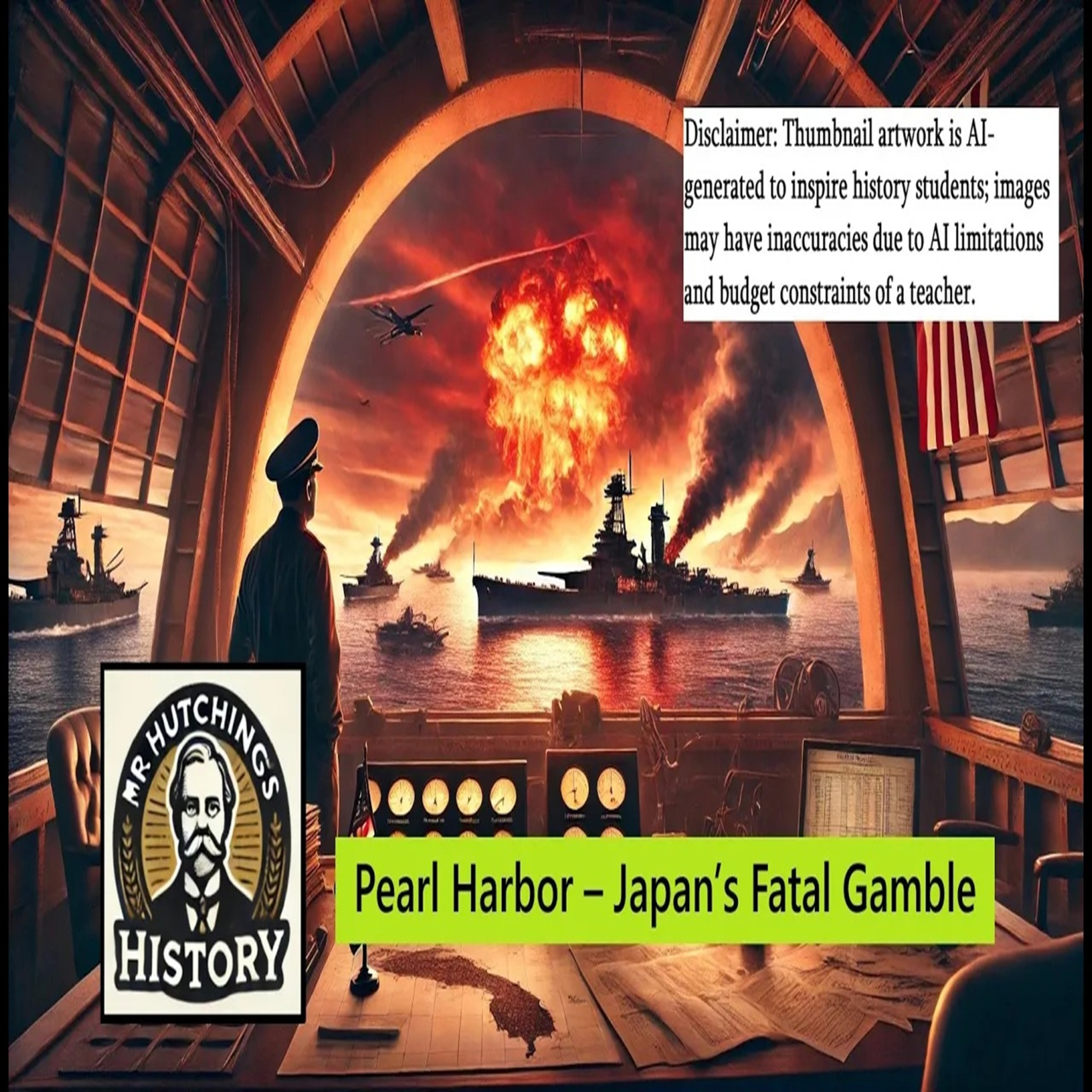 Mr. Hutchings HistoryPearl Harbor – Japan’s Fatal GambleWelcome to Mr. Hutchings History, where we explore pivotal moments in world history. In this episode, we analyze the Japanese attack on Pearl Harbor on December 7, 1941, and why Japan made this bold decision. Discover how Japan’s imperial ambitions, U.S. economic sanctions, and resource needs led to this fateful event.
We’ll discuss Admiral Yamamoto’s strategy, the devastation of the attack, and why it ultimately backfired, drawing the U.S. into World War II. Explore the immediate and long-term consequences, including America’s mobilization and the shift from isolationism to global engagement.
Unpack historic...2024-11-1915 min
Mr. Hutchings HistoryPearl Harbor – Japan’s Fatal GambleWelcome to Mr. Hutchings History, where we explore pivotal moments in world history. In this episode, we analyze the Japanese attack on Pearl Harbor on December 7, 1941, and why Japan made this bold decision. Discover how Japan’s imperial ambitions, U.S. economic sanctions, and resource needs led to this fateful event.
We’ll discuss Admiral Yamamoto’s strategy, the devastation of the attack, and why it ultimately backfired, drawing the U.S. into World War II. Explore the immediate and long-term consequences, including America’s mobilization and the shift from isolationism to global engagement.
Unpack historic...2024-11-1915 min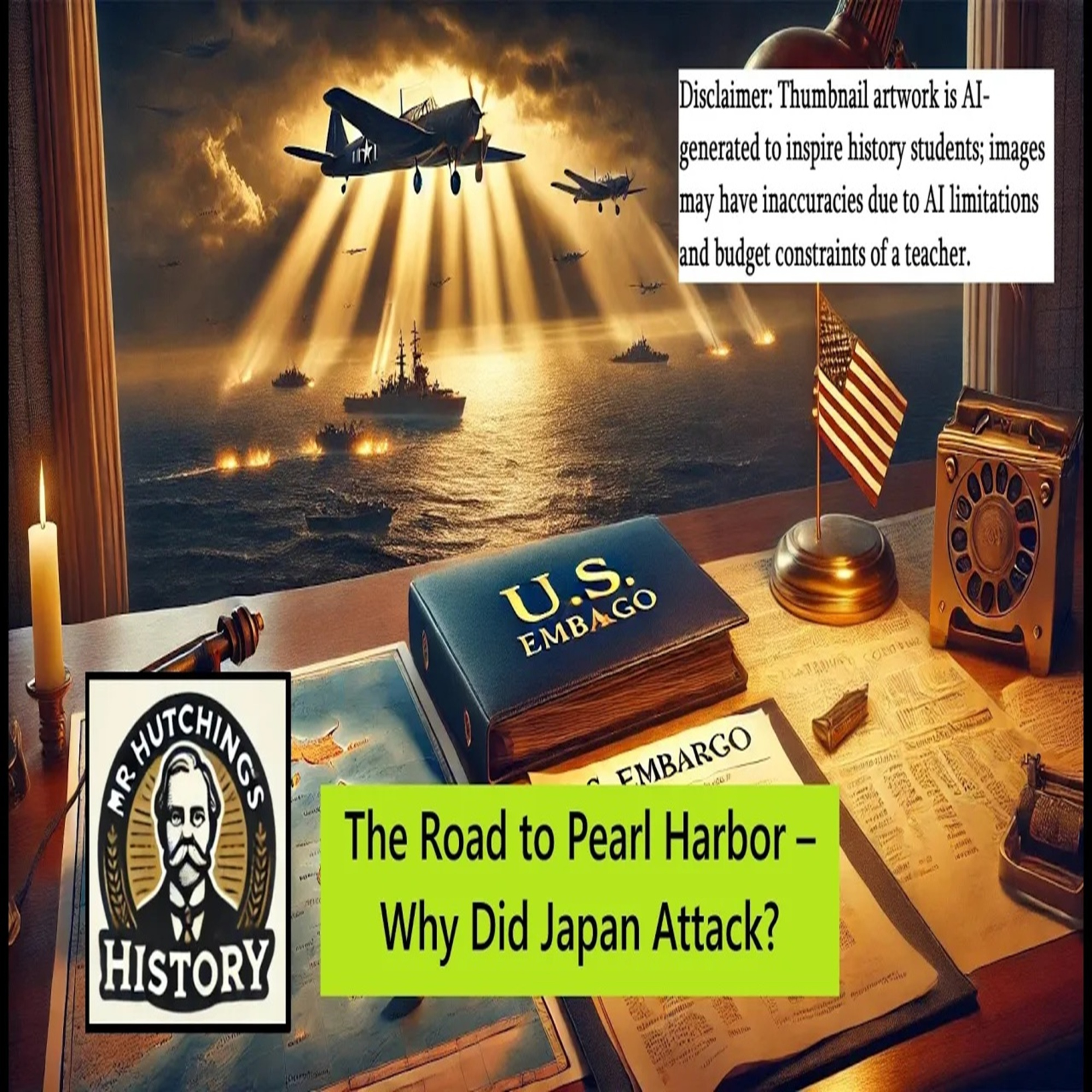 Mr. Hutchings HistoryThe Road to Pearl Harbor – Why Did Japan Attack?Welcome to Mr. Hutchings History, where we explore pivotal moments that changed the world. In this episode, we delve into the Japanese attack on Pearl Harbor in December 1941, a turning point that propelled the U.S. into World War II. Discover the geopolitical tensions, including Japan’s imperialist ambitions and the U.S. oil embargo, that set the stage for this bold strike.
Learn about Admiral Yamamoto’s strategic gamble, the devastating impact on the U.S. Pacific Fleet, and how the attack transformed public sentiment in the United States, galvanizing its entry into the global conflict. We’l...2024-11-1912 min
Mr. Hutchings HistoryThe Road to Pearl Harbor – Why Did Japan Attack?Welcome to Mr. Hutchings History, where we explore pivotal moments that changed the world. In this episode, we delve into the Japanese attack on Pearl Harbor in December 1941, a turning point that propelled the U.S. into World War II. Discover the geopolitical tensions, including Japan’s imperialist ambitions and the U.S. oil embargo, that set the stage for this bold strike.
Learn about Admiral Yamamoto’s strategic gamble, the devastating impact on the U.S. Pacific Fleet, and how the attack transformed public sentiment in the United States, galvanizing its entry into the global conflict. We’l...2024-11-1912 min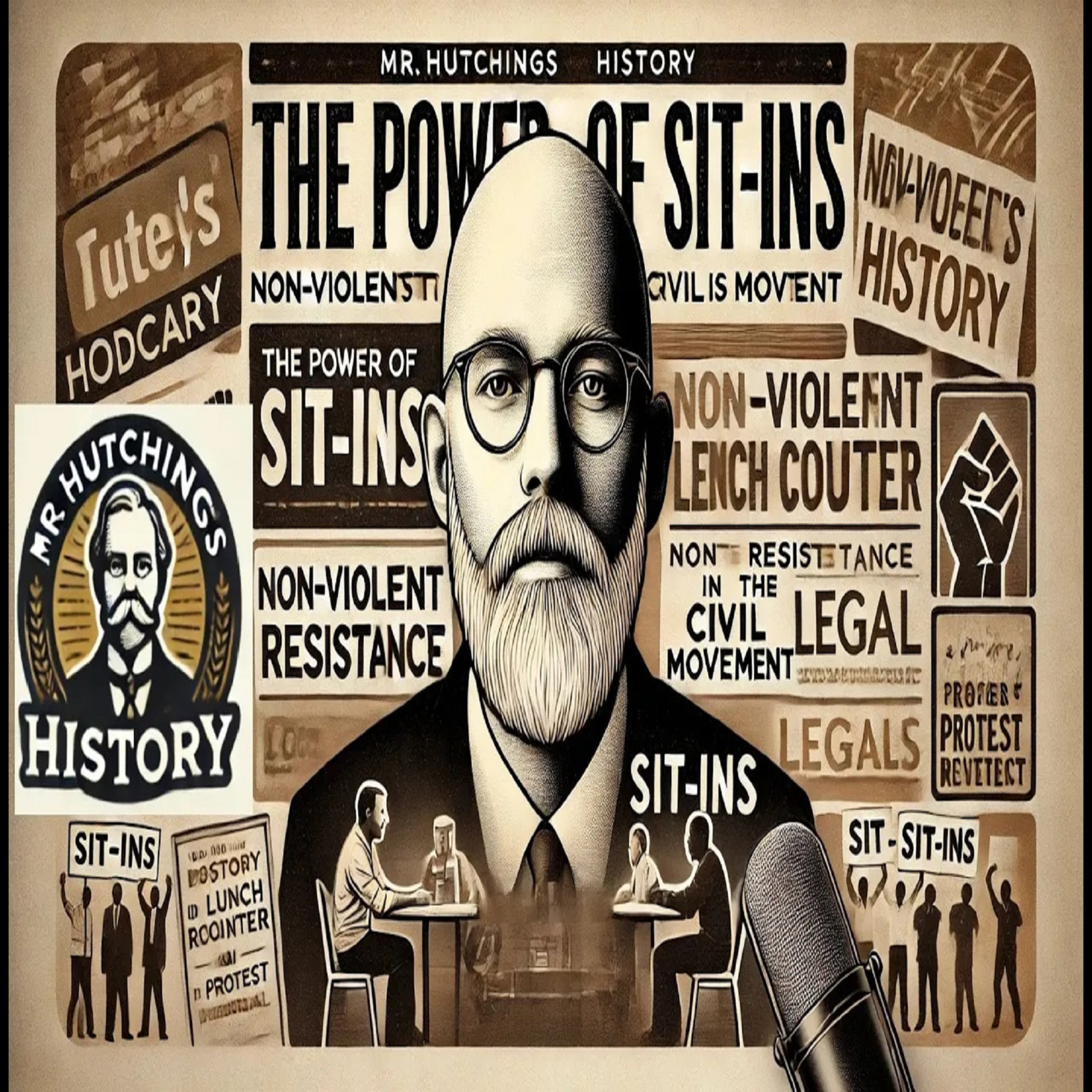 Mr. Hutchings HistoryThe Power of Sit-Ins – Non-Violent Resistance in the Civil Rights MovementIn this episode of Mr. Hutchings History, we examine the 1960 sit-ins—a defining moment in the Civil Rights Movement. Starting with four Black students at a Greensboro lunch counter, these non-violent protests spread nationwide, challenging segregation in public spaces. Explore the role of the Student Nonviolent Coordinating Committee (SNCC), the discipline and strategy behind the protests, and the powerful legacy of grassroots activism that reshaped America.
#IBHistory #CivilRightsMovement #SitIns #SNCC #NonviolentProtest #Greensboro1960 #StudentActivism #HistoryPodcast #RacialEquality #IBDP #MrHutchingsHistory
Works Cited
Arsenault, Raymond. Freedom Riders: 1961 and the Struggle for Racial Justice. Oxford UP, 2006.
Br...2024-11-1810 min
Mr. Hutchings HistoryThe Power of Sit-Ins – Non-Violent Resistance in the Civil Rights MovementIn this episode of Mr. Hutchings History, we examine the 1960 sit-ins—a defining moment in the Civil Rights Movement. Starting with four Black students at a Greensboro lunch counter, these non-violent protests spread nationwide, challenging segregation in public spaces. Explore the role of the Student Nonviolent Coordinating Committee (SNCC), the discipline and strategy behind the protests, and the powerful legacy of grassroots activism that reshaped America.
#IBHistory #CivilRightsMovement #SitIns #SNCC #NonviolentProtest #Greensboro1960 #StudentActivism #HistoryPodcast #RacialEquality #IBDP #MrHutchingsHistory
Works Cited
Arsenault, Raymond. Freedom Riders: 1961 and the Struggle for Racial Justice. Oxford UP, 2006.
Br...2024-11-1810 min The Healthy Mama Podcast095: How To Eat, Supplement, And Exercise For Optimal Health With Dr. John E. LewisWondering what the most important steps are to feel amazing?Want to set yourself up for the best chance of avoiding cancer, dementia, heart disease, and autoimmune conditions?Feeling frustrated and out of control with your health?Then you’ll want to check out this interview with Dr. John Lewis, founder of Dr. Lewis Nutrition, professor at the University of Miami Miller School of Medicine, and passionate about educating people on the value of nutrition, dietary supplementation, exercise, and health. During this beautiful conversation, Dr. Lewis shares a unique polysaccharide supplement, his 5 com...2024-07-1645 min
The Healthy Mama Podcast095: How To Eat, Supplement, And Exercise For Optimal Health With Dr. John E. LewisWondering what the most important steps are to feel amazing?Want to set yourself up for the best chance of avoiding cancer, dementia, heart disease, and autoimmune conditions?Feeling frustrated and out of control with your health?Then you’ll want to check out this interview with Dr. John Lewis, founder of Dr. Lewis Nutrition, professor at the University of Miami Miller School of Medicine, and passionate about educating people on the value of nutrition, dietary supplementation, exercise, and health. During this beautiful conversation, Dr. Lewis shares a unique polysaccharide supplement, his 5 com...2024-07-1645 min The Blake Mayfield PodcastEp. 253 | Fall River Brewing Co. Founder/CEO John HutchingsBlake is joined on today's episode by John Hutchings, the Founder/CEO of Fall River Brewing Company in Redding, CA. The show kicks off with Blake asking John why he wanted to found Fall River Brewing, along with if the brewery is a bigger success than John could've imagined and what the ups and downs of owning a small has been like since it's founding (1:43). Next, John explains why he wanted to launch his show "Forward Drinking Podcast" last year, as well as what his favorite Fall River beverage is, and if he would ever expand into Vegas (23:32). Lastly, Blake...2024-04-241h 03
The Blake Mayfield PodcastEp. 253 | Fall River Brewing Co. Founder/CEO John HutchingsBlake is joined on today's episode by John Hutchings, the Founder/CEO of Fall River Brewing Company in Redding, CA. The show kicks off with Blake asking John why he wanted to found Fall River Brewing, along with if the brewery is a bigger success than John could've imagined and what the ups and downs of owning a small has been like since it's founding (1:43). Next, John explains why he wanted to launch his show "Forward Drinking Podcast" last year, as well as what his favorite Fall River beverage is, and if he would ever expand into Vegas (23:32). Lastly, Blake...2024-04-241h 03 Forward Drinking PodcastTimber Titan Zane Peterson: From High School to Forestry PhenomThis episode features a conversation with Zane Peterson, a young entrepreneur who, straight out of high school, built a successful forestry business in the timber industry. Peterson's journey from brokering wood chips to managing a multi-faceted timber operation showcases his innovation, resilience, and the impact of good mentorship. Despite his youth, Peterson navigated industry challenges, seized opportunities presented by legislation and market needs, and leveraged relationships to grow his business. The episode touches on the importance of sustainable forest management, the role of the timber industry in rural economies, and the power of entrepreneurship to drive change and provide...2024-03-1542 min
Forward Drinking PodcastTimber Titan Zane Peterson: From High School to Forestry PhenomThis episode features a conversation with Zane Peterson, a young entrepreneur who, straight out of high school, built a successful forestry business in the timber industry. Peterson's journey from brokering wood chips to managing a multi-faceted timber operation showcases his innovation, resilience, and the impact of good mentorship. Despite his youth, Peterson navigated industry challenges, seized opportunities presented by legislation and market needs, and leveraged relationships to grow his business. The episode touches on the importance of sustainable forest management, the role of the timber industry in rural economies, and the power of entrepreneurship to drive change and provide...2024-03-1542 min Forward Drinking PodcastFinding Rhythm in Life: The Jeremy Schulz StoryImagine overcoming a debilitating speech impediment and Tourette Syndrome, rocking the music world, and then walking 3,100 miles to find yourself. Jeremy Schulz's incredible life journey, shared on the latest episode of the Forward Drinking Podcast, is a testament to the resilience of the human spirit. From drumming his way to fluency to surviving near-death experiences during a solo 3,100 mile cross-country trek, Schulz's story is a rollercoaster of triumphs and tribulations. Tune in to hear how he turned his darkest moments into a beacon of hope and inspiration.Thanks for listening to the Forward Drinking Podcast! If this...2024-02-0245 min
Forward Drinking PodcastFinding Rhythm in Life: The Jeremy Schulz StoryImagine overcoming a debilitating speech impediment and Tourette Syndrome, rocking the music world, and then walking 3,100 miles to find yourself. Jeremy Schulz's incredible life journey, shared on the latest episode of the Forward Drinking Podcast, is a testament to the resilience of the human spirit. From drumming his way to fluency to surviving near-death experiences during a solo 3,100 mile cross-country trek, Schulz's story is a rollercoaster of triumphs and tribulations. Tune in to hear how he turned his darkest moments into a beacon of hope and inspiration.Thanks for listening to the Forward Drinking Podcast! If this...2024-02-0245 min Forward Drinking PodcastFrom MMA Fighter to Entrepreneur: Caleb Vallotton on Mental ToughnessHost John Hutchings sits down with Caleb Vallotton, a former professional combat sports athlete turned entrepreneur. Caleb shares his journey from a promising wrestling career in high school to earning a scholarship at Oregon State University. He discusses the importance of goal setting and the mental toughness required to excel in sports and entrepreneurship.Caleb's story is one of perseverance and determination, as he overcame challenges and setbacks along the way. He talks about the rewards he experienced early on in his career, such as beating opponents who had previously defeated him. These small victories fueled his...2023-08-2949 min
Forward Drinking PodcastFrom MMA Fighter to Entrepreneur: Caleb Vallotton on Mental ToughnessHost John Hutchings sits down with Caleb Vallotton, a former professional combat sports athlete turned entrepreneur. Caleb shares his journey from a promising wrestling career in high school to earning a scholarship at Oregon State University. He discusses the importance of goal setting and the mental toughness required to excel in sports and entrepreneurship.Caleb's story is one of perseverance and determination, as he overcame challenges and setbacks along the way. He talks about the rewards he experienced early on in his career, such as beating opponents who had previously defeated him. These small victories fueled his...2023-08-2949 min Forward Drinking PodcastFrom Fields to Fundraising: The Entrepreneurial Evolution of Luke Miner and YouCaringFrom his humble beginnings in a farming community in Central Oregon to co-founding, growing, and then selling the crowdfunding platform, YouCaring, Luke Miner's entrepreneurial journey is extraordinary.He talks about wanting to be a pastor like his dad when he was younger. Luke also shares about his first business - a Christmas tree lot - and how it helped him learn about running a business.Luke is candid about how it felt to sell the business he helped create. His account of the process, the highs and lows, and the life-changing outcome is a must-listen.2023-06-0146 min
Forward Drinking PodcastFrom Fields to Fundraising: The Entrepreneurial Evolution of Luke Miner and YouCaringFrom his humble beginnings in a farming community in Central Oregon to co-founding, growing, and then selling the crowdfunding platform, YouCaring, Luke Miner's entrepreneurial journey is extraordinary.He talks about wanting to be a pastor like his dad when he was younger. Luke also shares about his first business - a Christmas tree lot - and how it helped him learn about running a business.Luke is candid about how it felt to sell the business he helped create. His account of the process, the highs and lows, and the life-changing outcome is a must-listen.2023-06-0146 min Forward Drinking PodcastBreaking Barriers and Building Empires: The Inspiring Story of Multi-Entrepreneur Cynthia StephensGet ready for a high-energy, awe-inspiring podcast episode featuring the incredible Cynthia Stephens, a powerhouse entrepreneur, army veteran, philanthropist, and mother. Host John Hutchings takes us on an unforgettable journey through Cynthia's inspiring story, starting with her humble upbringing in East St. Louis, Illinois, and her unshakable determination to forge a better life through education, military service, and entrepreneurship.Dive into the exhilarating world of entrepreneurship as Cynthia and her husband Eric launch seven successful businesses, including Stephens Electrical Group, a union electrical contracting firm, SnL Group, a general contracting company, real estate investments, and even CEM...2023-04-1453 min
Forward Drinking PodcastBreaking Barriers and Building Empires: The Inspiring Story of Multi-Entrepreneur Cynthia StephensGet ready for a high-energy, awe-inspiring podcast episode featuring the incredible Cynthia Stephens, a powerhouse entrepreneur, army veteran, philanthropist, and mother. Host John Hutchings takes us on an unforgettable journey through Cynthia's inspiring story, starting with her humble upbringing in East St. Louis, Illinois, and her unshakable determination to forge a better life through education, military service, and entrepreneurship.Dive into the exhilarating world of entrepreneurship as Cynthia and her husband Eric launch seven successful businesses, including Stephens Electrical Group, a union electrical contracting firm, SnL Group, a general contracting company, real estate investments, and even CEM...2023-04-1453 min